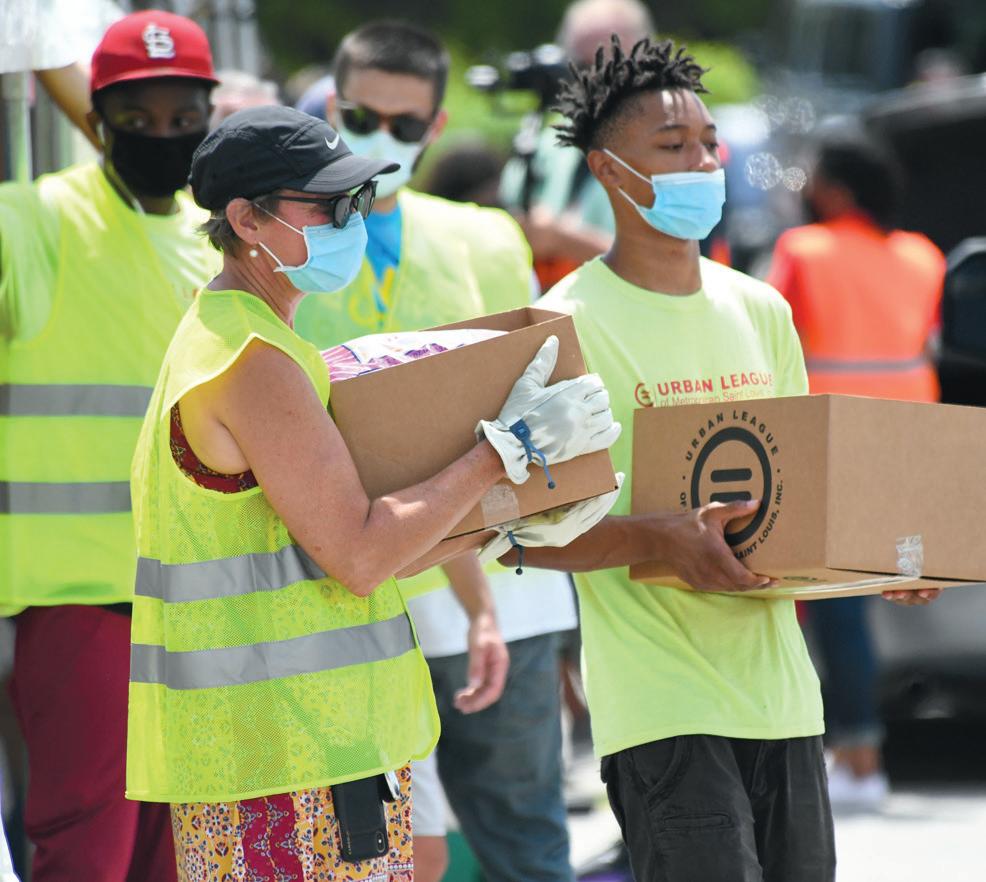
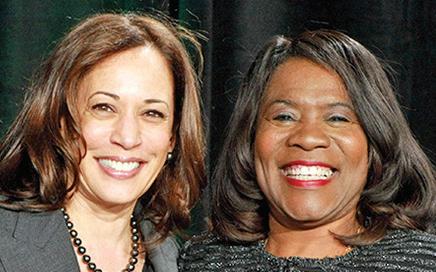
AKA congratulates Sen. Kamala Harris




AKA congratulates Sen. Kamala Harris

for U.S.
O.
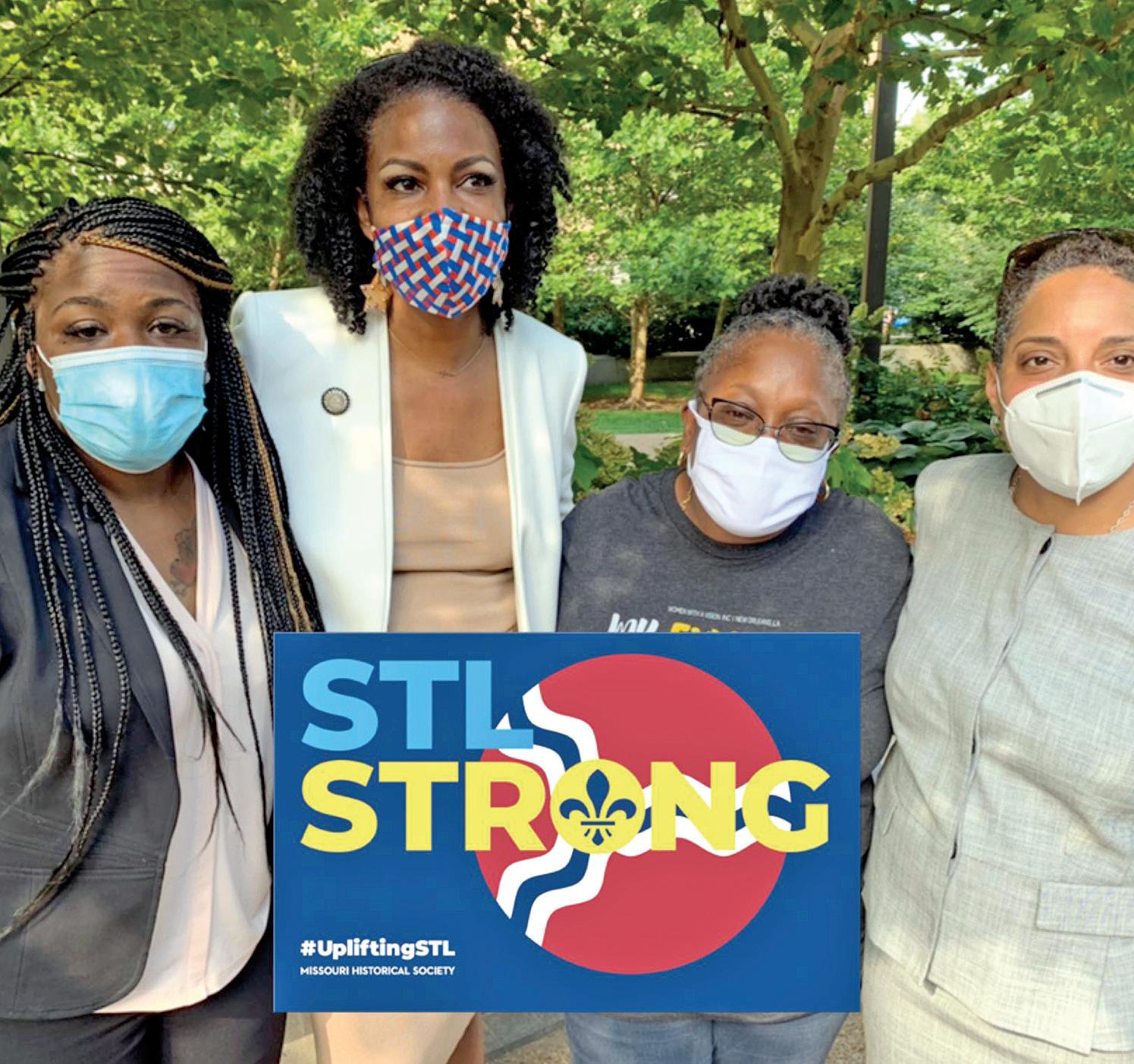
By Rebecca Rivas Of The St. Louis American
Ferguson activist Cathy “Mama Cat” Daniels is heading to the March on Washington in Washington D.C. on August 28, and she’s bringing a bit of Black Girl Magic with her.
“I think about the historic election we just had and these black women who went
through a lot,” Daniels said. “They had pounds of dirt just thrown at them. They stood up, just like our ancestors. They stood up against so much, I’m proud to say.” Daniels is speaking of the historic Democratic primary election on August 4. Ferguson activist and nurse Cori Bush beat 10-term incumbent U.S. Rep. Wm. Lacy Clay; she is now set to become Missouri’s first African-American congresswoman.
Voters also re-elected progressive incumbents St. Louis Circuit Attorney Kimberly Gardner and St. Louis Treasurer Tishaura O. Jones. None of them faces a Republican challenger in November who garnered a significant number of primary votes.
But Daniels is also ready to be inspired by marching among thousands of others in
By Sophie Hurwitz
For The St. Louis American
with Washington Park Cemetery Anti-Desecration League
Mourners paying respects to their loved ones buried at Washington Park Cemetery have, since the 1980s, visited the historically Black cemetery under the shadow of 6 large advertisement billboards towering over the headstones. That is no longer the case.
On Monday, August 17, the billboard structures started coming down. This was pursuant to the settlement of a lawsuit that activist Wanda Brandon filed against the St. Louis-based outdoor advertising company DDI Media, which owns the billboards and

Workers with Elliott Media removed billboards from Washington Park Cemetery on Monday, August 17 pursuant to the settlement of a lawsuit that activist Wanda Brandon filed against the St. Louis-based outdoor advertising company DDI Media. The last structure came down on August 19.
If it doesn’t kill you, it’s definitely not ‘totally harmless,’ as Trump claimed
By Sylvester Brown Jr. Of The St. Louis American
“We have tested over 40 million people, President Donald Trump said on July 4. “By so doing, we show cases, 99% of which are totally harmless.”
When confronted with the number of Americans who have died from COVID-19 (about 170,000 to date), President Trump typically cites the high survival rate. The president is mostly correct. Health officials say that between 96 to 98% of people who’ve contracted the new coronavirus do indeed survive.

However, the “totally harmless” part of Trump’s equation is way off-base. The research is ongoing but recent data indicates that many COVID-19 survivors are still grappling with a host of debilitating problems long after they’ve gotten over the initial illness. Lingering conditions can include heart, lung, kidney and brain damage, blood clotting and ongoing acute respiratory distress.
Elmer (El) Covington, 52, of University City fits the description of what doctors refer to as “long-haulers” – survivors who still experience mental or physical problems after fighting off an acute new coronavirus infection.
Covington contracted COVID-19 in early March. He said he was adhering to health guidelines but, unfortunately, a visit to his cousin’s house proved life-threatening. Covington didn’t know his cousin was infected at the time, but a few days after the visit he started feeling fatigued
By Sophie Hurwitz
For The St. Louis American
St. Louis County Library fired 122 part-time workers on August 11 — about one-third of whom were Black — with the intention of being “good stewards” of taxpayers’ dollars due to a decrease in library activity, said Kristen Sorth, president of the county library system. Employees, however, said library workers are busier than ever with some people out sick with COVID-19 and new duties associated with the pandemic.
While Sorth said the number of minority employees fired reflected the library’s overall workforce, some branches lost almost all of their Black employees, workers said. County library workers spoke with The American on the condition of anonymity.
“We love our patrons,” one Black librarian said. “We know them by name. We know their kids; we


Sweetie Pie’s Tim Norman arrested for 2016 alleged murder-for-hire of his nephew James Tim Norman, 41, the son of Miss Robbie Montgomery of Sweetie Pie’s restaurants and of the reality series “Welcome to Sweetie Pie’s,” was arrested in Jackson, Mississippi on August 18 by federal authorities in an alleged murder for hire plot involving Norman and an exotic dancer from Memphis, Tennessee, Terica Ellis. The homicide victim was his own nephew, 18-year-old Andre Montgomery, who was gunned down in 2016 outside a house on Natural Bridge Rd. in St. Louis.
abouts. Authorities say Ellis’ phone was pinged the vicinity of the homicide on the evening of March 14, 2016. In the days afterward, authorities say Ellis deposited $9,000 in various bank accounts and Norman attemped to collect on $450,000 life insurance policies he obtained on his neph-ew, to which he was the sole beneficiary.
The Montgomery family is said to be devas-tated by this development and has not released a public statement.
U.S. Attorney Jeff Jensen credited the St. Louis PD, the FBI for the investigation. The arrests are said to be part of Operation Legend, a partnership to solve outstanding violent crimes in St. Louis and other cities in the U.S.

The U.S. Attorney’s Office of the Eastern District of Missouri charged Norman and Ellis with “conspiracy to use inter-state commerce facilities in the commission of a murder-for-hire, resulting in death.”
According to the complaint, Norman, flying in from Los Angeles, and Ellis, coming up from Memphis, were both in St. Louis the day before the murder and they activated temporary cell phones to communicate his nephew’s where-
2 men indicted in 2002 killing of Run-DMC’s Jam
Master Jay
On Monday, two men described as longtime suspects have been indicted in the 2002 murder of hip hop pioneer Jam Master Jay (his born name was Jason Mizell The men were identified as Washington and Karl Jordan eral prosecutors say the motive for the murder was a cocaine deal gone wrong. In a 10-count indictment, Washington and Jordan were charged with murder
while engaged in drug trafficking. Jordan pled not guilty at an arraignment on Monday. Washington, who is serving a prison sentence for robbery, is expected to be arraigned later this week. If convicted, both men face minimum 20-year prison sentences.
Jam Master Jay was a member of 1980s hiphop sensation Run-DMC with Joseph “Run” Simmons and Darryl “DMC” McDaniel Their hits included “It’s Tricky,” “Christmas in Hollis” and the Aerosmith remake collaboration “Walk This Way.”
MC Lyte files for divorce
It’s Lyte’s out on this match, because rapper MC Lyte recently filed for divorce from her husband of three years, entrepreneur John Lyte, whose born name is Lana Michele , cited irreconcilable differences for the split. The pair met on Match. com, got engaged in May 2017 and had a sunset wedding three months later in Montego Bay, Jamaica.

Keyshia Cole settles divorce from Daniel Gibson
Singer Keyshia Cole and former NBA star Daniel Gibson have reached a settlement in their divorce that

covers division of marital property, custody and support, according to court records obtained by The Blast. Cole originally filed for divorce back in September 2017, citing irreconcilable differences, and listed the date of separation as October 31, 2014. The couple got married in 2011.
‘The Rona’ hits Will and Jada’s production company
Ten employees of Will Smith and Jada Pinkett Smith’s production company, Westbrook, Inc. reportedly tested positive for the new coronavirus. A statement by Westbrook Inc. says, “We received 10 positive tests and the crew members quarantined and remain in quarantine. All 10 people were retested and have received negative results. We will continue to follow all official guidelines and safety protocols.”
The Smiths founded Westbrook Inc. last year as the parent company of Will’s television and film production company, Westbrook Studios. Its portfolio also includes Red Table Talk Productions, which produces Jada’s Facebook Watch series, “Red Table Talk.”
Sources: Associated Press, HipHopDX, Hollywood Life.com, Instagram, New York Times, MSN, Page Six, People, The Blast, The Daily Beast, The Jasmine Brand, TMZ, Twitter







We are in the streets. We are in elected offices. We are in institutions.
An organizer looks back, six years after the Ferguson Uprising
By Brittany Ferrell
For The St. Louis American
Growing up in rural Mississippi, I watched people set fire to the land, scorching the earth to cultivate the acreage – to improve its health and make way for future crops to grow beautifully, stronger, and in abundance. I was a young girl when I learned of this “prescribed burning,” but the necessity of its function I didn’t understand until I was well into adulthood, particularly in the aftermath of the Ferguson Uprising.
Six summers ago, after the lynching of 18-year-old Michael Brown by Ferguson Police Officer Darren Wilson, the City of Ferguson sent a shockwave around the world. For over four and a half inhumane hours, the Ferguson and St. Louis County police departments let Mike Mike’s slain teenage body lie, melting and bleeding out in the street. It was in this moment that those of us who dared not look away were forever changed.
We unapologetically took to the streets day after day in the longest standing revolt against the police to protest the glaring injustice. We lost our jobs. We took leave of absences from school. We lost our homes. Some of us had none of those things to lose; some of us had everything to lose. We showed up on the streets anyway.
The police entered a community and murdered someone’s
son in the middle of the street and denied his mother access to his lifeless body. We had a moral imperative to respond to this atrocious act of violence and give up convention to protest the unacceptable. We knew that it could be anyone of us or our loved ones next. Our love and commitment to ourselves and our home gave us the fuel we needed to reckon with the best of the worst this city, this state, and this country has to offer. Six years later, we are embroiled in the same fight.
What does it mean for our city and our state to be an epicenter of a global movement for Black lives and yet, under the gaze of the world, continue to grip the reins of a status quo that is stagnation, that is devastation, that is death for too many? It means we mobilize, organize, and dissent even when it is unpopular.
Six years ago, the political landscape and narrative around the Movement for Black Lives were prickly. The three-word declaration “Black Lives Matter” could get you fired or leave you socially isolated. Today, it is plastered on boarded-up stores on Delmar Boulevard and across the homepage of Amazon.com. We did not get here by happenstance.
Over the past six years, we’ve built organizations and infrastructure, we’ve won over hearts and minds, and we’ve sent a resounding message across the city, state, and nation
Open seven days a week, SSM Health
Cardinal Glennon Pediatric Urgent Care in North County offers convenient after-hour treatment for patients from newborn to 18 years of age.
Minor to moderate injuries and illnesses include:
• Allergies
Asthma attack
• Burns
• Cough/cold/flu-like symptoms
• Earache/ear infections
Eye irritation or pink eye
• Minor scrapes/cuts/bruises
• Rashes and skin problems
• Sprains and strains
X-ray services for minor broken bones
Monday - Friday: 4:30 - 11 pm Saturday and Sunday: 11 am - 10 pm
3878 Pershall Road Ferguson, MO 63135
Call 314-738-2750 or visit cardinalglennon.com/UrgentCare to learn more.

that freedom from criminalization and over-policing, economic injustice, housing injustice, and deep systemic racism cannot wait. Despite those who scoff at the rebellion of 2014, I am proud of the organizing that is now happening in our city. It is no coincidence that work is being led by those of us who stayed in the streets and refused to let the world look away. Beyond hearts and minds, we have pushed for systems change. Recently, Close the Workhouse won a successful campaign to shut down the abhorrent medium-security jail, slashing a $16 million budget and loudly pairing its demise with a demand to immediately reimagine public safety.
Missouri elected its first Black congresswoman in MO-1, Cori Bush, who successfully defeated a 10-term incumbent of a political dynasty that maintained the office for over 50 years. St. Louis organizers, like those of Action St.
Louis, successfully campaigned for and won the reelection of the city’s first Black circuit attorney, Kimberly Gardner, and protected the position of city treasurer held by another Black woman, Tishaura O. Jones, despite malicious and sexist attacks from their opposition, the police union, and the Missouri attorney general . None of these wins were inevitable.
Our pathway to our current political landscape required creativity and critique. It demanded refinement of our vision for justice and clarity in the strategies needed to achieve it. Ferguson seeded the collective resistance that spread like wildfire across the country and ushered in the possibility to reimagine justice. That same call is now echoing across the nation with demands to divest from policing and to elect progressive Black representation. None of this change comes without blowback. That is inev-
Brittany Ferrell (left) led a protest march in St. Louis on November 23, 2014 along with Ashley Yates and Alexis Templeton of Millennial Activists United.
itable. We are disrupting power structures that are designed to function in tandem with injustice. In the past few months, we have seen intense backlash nationally and locally.
The man in the White House has encouraged the police, military, and his White nationalist base to commit acts of violence and death against protesters. The federal police have been welcomed by St. Louis Mayor Lyda Krewson to unconstitutionally infiltrate the streets of our city, as they did in Portland and Chicago, where agents were spotted throwing peaceful protestors into the backs of unmarked vans.
Despite Gardner’s victorious August 4 primary victory, the current, unelected governor of Missouri, Mike Parson, has asked state lawmakers to approve a bill that expands the powers of State Attorney Eric Schmitt to disempower her position as the city’s circuit attorney.
I celebrate the wins of the people, yet I am perpetually disappointed by the failures of our leadership on a city, state and federal level. I loathe their commitment to the status quo, their inability to imagine a different world. James Baldwin said plainly, “People are trapped in history, and history is trapped in them.” But in the legacy of those who came before us, we will persist. For us, change is irresistible. The leadership of this city is often on the wrong side of justice. If the past 6 years are any indication, we have moved beyond the hashtags and we are bringing people with us. We are in the streets. We are in elected offices. We are in the institutions — the academy, the hospitals, the courthouses and more. We are in the community deeply engaging with our neighbors about what impacts their lives. We are protesting. We are dissenting. We are organizing. And we will not stop.
One day we’ll look back and realize all along that the change we struggled so hard for was destined. The Ferguson Uprising and the national resistance that followed will all make sense. Six years ago, we issued a “prescribed burning” to cultivate the land, and today that fire is still burning. We are fostering a new kind of justice. We envision a new world in which we all thrive – where the Michael Browns and Kimberlee Randle Kings live long full lives. And we are implicated and committed to reveling in good trouble to see it through until the end.
Brittany Ferrell, MPH, RN, is a national organizer and policy associate at Black Futures Lab, a volunteer organizer with Close the Workhouse and lead organizer at Action St. Louis.

Since Chicago economist James Heckman won the 2000 Nobel Prize in Economic Sciences, there has been no serious debate about whether early investments in human potential yield returns to stabilize families, reduce crime, and grow regional economies. They do. This is especially the case with early childhood programs which, research proves, increase economic development over time. So, credit should be given to the hundreds of parents, early childhood advocates and elected officials organizing to increase public investment in kids of our region under the banner of the Ready by Five Campaign.
Because of a rally at St. Louis County government offices this week, phone banking by organizers, Zoom meeting displays by County Council members and some pretty heated Twitter exchanges, most of the energy and headlines have centered on the effort in St. Louis County to put an economic development sales tax on the November 3 ballot. But, a different measure to enhance pre-kindergarten programs is already set for a vote in the city on November 3. In June, the St. Louis Board of Aldermen approved Board Bill 8 (sponsored by Alderwoman Shameem Clark Hubbard and passed without opposition) to have voters decide whether to increase the property tax rate for the community children’s services from the 19 cents per $100 of assessed valuation to 25 cents due to increase early childhood programming for children aged five years and younger. If approved by the voters, the tax would yield approximately $2.3 million annually. The fund would be administered by the St. Louis Mental Health Board, which has overseen the children’s services tax in the city since 2004.
fund) are regressive, tending to hurt poor people more than those with resources. In the toughest economic recession since the Great Depression, raising taxes is one thing, but a higher sales tax will land squarely on the people in the Urban League of Metropolitan St. Louis’ weekly mass distribution lines who also need early childhood services most. The city proposal raises less money, but it does so in a more socially responsible way.
Second, transparency differs in the respective bills’ language about purpose and oversight. Tying an early childhood tax to a yet-tobe established economic development board, as the county proposal would do, when there is already a community children’s service fund with built in public oversight raises questions. With as much language about sewer infrastructure and construction as about children and youth, the county bill is at best murky. Conversely, the St. Louis Mental Health Board has a track record going back 25 years of effectively deploying public resources with confidence and without controversy.
n the child advocates working in the county helped to make the city effort possible. But, differences in policy and politics have led to conflict in the ambitious county proposal, which endangers the effort that proponents say is critical for advancing racial
Finally, who carries the ball matters. The wide range of community leaders engaged in the county effort is unquestionable. But, County Council Chair Lisa Clancy mis-stepped when she didn’t bring her African-American colleagues into the conversation early and wasn’t clear about her own connection to the effort before it came to the council. She also probably shouldn’t have been the one to call for a rally at the same time as the projected board vote. In contrast, the city measure quietly earned the support of the alderpersons and enjoyed the leadership of the St. Louis Black Aldermanic Caucus.
In fact, the child advocates working in the county helped to make the city effort possible. But, differences in policy and politics have led to conflict in the ambitious county proposal, which endangers the effort that proponents say is critical for advancing racial equity.
First, sales taxes (the engine for the county
Wisely, on Tuesday, August 18, Clancy pulled the bill, promising to make some changes with hopes of shoring up support. If she is wise and committed to the benefits early childhood programs offer our kids, she will look to the city for lessons – and Black leadership for guidance.
We must reimagine and redesign our school system
By Krystal Barnett
For The St. Louis American
The quarantine from COVID-19 has transformed public education as we know it and put the job of educating St. Louis’ children squarely (and at times, solely) into the hands of their families. We’ve risen to the challenge and quickly converted our living spaces into learning ones. But in-between adjusting to Zoom classrooms and conquering new math concepts, parents have been asking questions about what the future of education looks like for our children.
Historically, without organized, parent-led advocacy, and in the absence of a clear student learning approach and needcentered philosophy, education leaders and policymakers have designed systems that place their focus on what is best for the public education system –not necessarily the children. The systems that educate our kids will ask for more resources, more ways to protect their jobs, and yet, it always feels like our children somehow end up with less. Now, the coronavirus has completely turned our normal way of life upside down, delivering a Grand-Canyon-sized shift in teaching and learning. But within this crisis, there is an unprecedented opportunity and a responsibility to reimagine schools – not just the buildings in which our children are educated, but also the systems, concepts, resources, and environment that inform their learning.
As
By Mike Jones
Of The St. Louis American
Max Ehrmann reminds us in “Desiderata” (1927) that, whether or not it is clear to us, the universe is unfolding as it should. That thought came to mind when I saw that Joe Biden had selected U.S. Senator Kamala Harris to be the Democratic nominee for vice president of the United States. I didn’t think that because of her formable political resume –San Francisco district attorney, California attorney general and U.S. Senator – though this experience is sufficient to recommend her. I say this because Kamala Harris is emblematic of an America struggling to be born.
But why is the new America struggling to be born? It’s because there’s an old America that refuses to die.
America in theory is founded on an a priori truth, that “all men are created equal,” and believes itself to be fundamentally good and innocent and, whatever its heinous misdeeds, they are just necessary evils on the way to “a more perfect union.”
The realty of America bears no resemblance to its creation myth. In reality America is founded upon the lie that white lives matter more than others, that white lives have intrinsically more value than the lives of others. It’s this lie that’s at the core of white identity in America, and it’s this lie the majority of white Americans will protect at all costs.
Witness their strong support of Donald Trump despite his corruption and incompetence. Donald Trump is the mirror white America has kept
covered, and now it can no longer delude itself about the mendacity and venality of the image. Trump can be who he is, because he too is America.
To appropriate and paraphrase Lincoln, the November 3 election will test whether a nation so conceived can continue to endure.
But what is this new America struggling to be born?
It’s a multiracial, multicultural, inter-generational America.

This America is 40% people of color, with over 47 million immigrants. It’s 51% female with more college-educated women in the workforce than college-educated men. It’s young, with 60% of the population under 45. Within the next 25 years, a majority of its population will be non-white. It could become an America that transforms itself into a Social Democratic democracy that values human life over corporate profit, and where the phrase E Pluribus Unum is a reality and not a motto.
This new America struggling to be born is the context for Joe Biden’s selection of Kamala Harris to be the Democratic nominee for vice president. Born and raised in California, she is a daughter of two immigrants, her mother from India and her father is from Jamaica. She is a woman of color, a graduate of Howard University and the University of California, who self-identifies as Black. Well educated and
Nicole Galloway understands
with infinite career possibilities, she chose a career in government and politics as a Black woman. She then proceeded to shatter the glass ceilings that limit the possibilities of Blacks and women.
Kamala Harris’ resume’ makes her the best VP choice, politically, but it’s her biography that makes her the right VP choice. It’s that biography that makes Harris more than representative of that emerging America. She is that emerging America. But that emblematic biography was 55 years in the making.
Much like epic fictional tales about the final battle between Good and Evil with the future of humanity at stake, despite the drama and uncertainty, the end of the story is already written. It’s clear who the Night King (Donald Trump) and Army of the Dead (his 40% of scared white voters) are, but we’re introduced to Arya Stark long before we understand who she is and her importance to the outcome.
Even if it’s not always clear how the universe is unfolding, that’s not to imply that the universe is either arbitrary or random. We don’t realize how the universe (like Game of Thrones) often provides an answer before we’re aware there’s even a question. Like another woman elevated to the high office during a time of great turmoil and uncertainty, you could say that Kamala Harris, like Arya Stark – or the Biblical Esther – was born “for such a time as this.”
Mike Jones is a member of The St. Louis American editorial board.
Change must start with what families need first. St. Louis is clamoring for a parent-centric approach to policymaking.
As we plan for what school will look like in the fall, we must plan for ensuring that all students and families have internet access and technological learning tools, we must individualize learning for each child, and we must empower parents to choose the offerings that are best for their families.

A shift in how we think about every aspect of our schools is daunting, but urgent. Changing systems might traditionally start with thinking through districts’ needs – gaps in funding, new programs that can be launched, new staff that can be hired, and more. We recommend a different approach.
Our organization – Bridge 2 Hope – is comprised of parents who are demanding just that. We are launching a new parent manifesto that calls for three specific actions from SLPS. First, every student must receive a personalized plan for academic recovery by November 1. The plan should capture the needs of the whole child – academics, mental health, resources, home life, parent support, communication, and equitable school practices. As parents, we see the importance of individualized attention every day. Because children in every family need varying levels of support or care, there’s no way a one-sizefits-all approach will succeed in our classrooms. Having a tailored plan for each child will help mitigate learning loss.
Second, we must ensure that each student, in every home,
has internet access and necessary technological devices and platforms. The devices and platforms must function appropriately and include specific student-based curriculums.
More importantly, the parents and students must have the essential guidance needed to navigate the technology efficiently.
And just as important, before school registration occurs, parents who are not comfortable sending their children into school buildings must be given a choice to continue with a district-provided at-home learning program for part of or all of the 2020-2021 school year. Every family faces different circumstances, and each should be able to choose the type of schooling – in-person or remote – that is right for them. These would be profound, much-needed changes. But in the last three months, we have learned some painful and powerful new things right alongside our children in our makeshift, at-home classrooms. We learned that life can change in an instant. Anything is possible.
We must reimagine and redesign our school system to meet the unique needs of this moment, and that design effort must be approached in a new and more inclusive manner that includes parent voices. SLPS and Charter Schools just have to be brave enough to allow it. Don’t squander your opportunity to transform the system for our new world.
Krystal Barnett is a St. Louis parent and executive director of Bridge 2 Hope St. Louis, a movement by and for parents calling for policy changes in schools.
Our next governor, Nicole Galloway, will make the mature decisions needed to keep our kids and grandparents safe. When professional sports teams saw players who’d recovered from coronavirus having heart problems, they decided to keep their players safe by calling off the season. Nicole understands these dangers and feels we need to get this pandemic under control before we open our schools.
On the other hand, Governor Parson, the boy from Bolivar, which only has one elementary, one intermediate, one middle, and one high school, wants all of our state schools open. It’s sad he wants our Missouri kids to be test monkeys. He thinks we should just throw them all together in school and see what happens when they get infected with coronavirus and share it with granny and granddad. Just ask Georgia how that’s working out for them!
Nicole Galloway understands what it takes to keep the citizens of Missouri safe. Join me on November 3 in voting Nicole Galloway for governor. The healthy future of Missouri depends on it.
Ellen Wentz Kirkwood
Worth his salt and salary
In response to Ms. Caravelli’s remarks that Mr. Jimmie Edwards is “overpaid,” he’s one of very few in STL public office who’s worth his salt and salary. Krewson and Gardner sure aren’t. The man could be a partner in a law firm earning at least three times his current salary minus the frustration and headaches of this job. I’ve sat in jury on
two cases he’s presided over as judge. Best judge I’ve ever seen. Period. Highly qualified, accomplished talent doesn’t come dirt cheap, Ms. Caravelli. You want to call out people who aren’t worth the taxpayers’ dollars? You should start at the mayor and circuit attorney’s offices.
Kevin Glass, Clayton
Insult to the voters of the city
The amendment to Missouri Senate Bill #1 proposed by state legislators to allow the governor to remove Circuit Attorney Kim Gardner is a
shameful insult to the voters of the City of St. Louis, who chose to re-elect Kim Gardner as circuit attorney by more than 60 percent of the vote. This bill does not address the underlying issues that lead to violent crime in our community. It does not offer investment into education, job training, or mental health support. Instead, Senate Bill #1



Jerome and Molly (Daniels) Redding of St. Louis celebrated their 15th wedding anniversary on August 6. She is on the faculty at HarrisStowe State University. He is a State of Missouri Probation and Parole officer. Congratulations from the St. Louis American family.

The Saint Louis Zoo will close the Emerson Children’s Zoo, which will remain open with free admission through the end of October.
“It was a heart-wrenching decision to close the Children’s Zoo; however, safety is our highest priority,” said President and CEO Jeffrey P. Bonner. “The Children’s Zoo was designed for high-touch and interactive experiences, which is
not conducive to a COVID or post-COVID environment.”
Animals residing at the Children’s Zoo are in the process of being relocated to other parts of the Zoo or moved to other facilities. The Tasmanian devils will remain at their current habitat in the Children’s Zoo area. While the zoo works to reimagine the 3.5-acre family and children’s area, a temporary dinosaur exhibit will open in its place in spring 2021.
City waives late fees if parking tickets are paid by August 31
St. Louis Treasurer Tishaura O. Jones, who resumed parking enforcement at curbs on June 1, will be waive all late penalties for those who pay off tickets—no matter how old— by August 31. Due to the pandemic, the office suspended ticketing and collections on March 16.
“The shut-down allowed us to migrate to a new system, which will offer new features such as the ability to set up
payment plans on outstanding balances, and contesting tickets online,” said Jones. “If you need additional help, we offer free 1-on-1 financial counseling and classes at the Office of Financial Empowerment.”
Payments will only be accepted online or in-person. To learn more, visit ParkLouie.com.
By Rev. Traci D. Blackmon For The St. Louis American
The selection of U.S. Senator Kamala Harris as Joe Biden’s running mate on the Democratic ticket is unprecedented and wise.
It is unprecedented because the strongest, most-consistent voting bloc of the Democratic Party – Black women – have finally earned the right of representation on the party ticket. This is novel not because of a lack of qualified Black woman candidates but rather because of a lack of political courage by Democrats to risk white fragility to embody the racial and gender inclusion the party espouses.

It is unprecedented because, although many women have run as candidates of independent parties, the Democratic Party has not displayed the courage to include a woman as a vice president on the party ticket since 1984 with Geraldine Ferraro. It is unprecedented because Senator Kamala is both African-American and Asian, embodying an American face and history of multi-racial resilience and strength muted too long in the collective narrative of our nation.’
It is also wise because Senator Harris’ congregational record is one that demonstrates a clear understanding of the challenges we currently face as a nation, and she is not afraid to address the needs of all of the people.
There are definitely valid grievances raised concerning her record as a prosecutor that warrant an acknowledgement and not an excuse. And yet, her voice on the Senate Judiciary Committee proved her willingness and ability to interrupt the status quo in the interest of racial, gender, and economic equity. The senator is strong in areas that complement the presidential candidate.
I believe Senator Harris is capable of seeing all of America, and that is needed after years of an administration whose highest priorities have been to quell the tide of unity without uniformity, to secure the absurd wealth of the few on the backs of the many working poor, and to maintain a false narrative of white supremacy that damages us all.
In this era of viral pandemics, rising rates of poverty, and virulent racism, there is no greater threat to democracy than the continued inept leadership of our current administration. There are some who will be angered by some of the wrongs of both Biden and Harris, and it is right to hold this tension. But there is absolutely no comparison between a Biden/Harris administration and the rampant demagoguery we are currently experiencing under Trump/Pence. It will continue to be our task to hold the feet of all elected officials to the fire. A Biden/Harris administration will be no different in that regard. But the current assault on the very fiber of democracy and political fortification of white supremacist ideology must cease at the ballot box on November 3.
Now is the time to regain control of our political process and continue our journey toward becoming the country of liberty and justice for all.
Rev. Traci D. Blackmon is associate general minister of Justice & Local Church Ministries for The United Church of Christ.

Continued from A1
watch them grow up. We love what we do, and that’s why this is heartbreaking for us.”
Those fired were 50% of the part-time staff at St. Louis County Library, Sorth said. They were selected based on seniority, meaning that everyone hired after 2017 was fired, she said. This meant that the group fired skewed disproportionately young and Black, given that increasing diversity in staffing has been part of the library’s strategic plan only since October 2018.
“And here we are in 2020, and they’ve turned around and fired countless of those staff that they promised to hire and promised to welcome into a profession that is majority-white,” a worker said.
“The stereotype is that librarians are old, and white, and crotchety, but there are so many new librarians coming into the field. We’re tattooed, we’re queer, we’re young, a lot of us are very radical people. So, I think that’s what was even more disheartening about this, because you stripped us of this opportunity.”
On Monday, August 17, in response to demands from a multi-racial group of employees in light of the firings, the St. Louis County Board of Trustees passed a resolution committing to “eliminating racial and social equity barriers in library programs, services, policies, and practices.”
A group of concerned Black current and former employees said that the layoffs were a “slap in the face” to the essential part-time workers who have been risking exposure to COVID-19 for the library without receiving health insurance.
“We’re putting our lives on the line for this,” said one current Black employee.
Since the onset of the pandemic, county library workers have been assigned new tasks. They deliver food for Operation Food Search, distribute books to people waiting in their cars, and provide educational services online. The libraries host diaper drives,
Continued from A1 and had bouts of diarrhea. One day while in the restroom, he passed out. Because he had no fever, he said doctors at St. Mary’s Hospital didn’t think it necessary to test him.

distribute books to people waiting in their cars, and provide educational services online.
connect people to unemployment services, and are now — thanks to $4 million in federal CARES Act funding — distributing laptops and hotspots to students.
For 122 out of about 600 library staffers, though, that work came to a sudden end on August 11. Sorth said 38% of those fired were people of color, when people of color comprise 30% of the total library staff. However, five of the nine employees fired at one North St. Louis County branch were Black, workers said. Another two branches lost 100 percent of their Black clerk staff. The firings, Sorth said, were not out of lack of funds. Sorth noted that circulation at the library was down 50% from a year ago in July, and the hours the library’s branches are open per week are currently down to under half of normal.
“We have to be good stewards of tax dollars and not pay people when we don’t have as much work or as many hours as we had before,” Sorth said.
“So, we made some hard deci-
In late March, however, Covington found himself in an ambulance on the way to Barnes-Jewish Hospital where he was diagnosed with the coronavirus.
Covington, who suffers from diabetes and hypertension, developed pneumonia, respiratory failure, acute kidney failure and septic shock. He spent a week, unconscious on a ventilator. The outlook for

sions. We paid our employees, both full and part time, during the shelter-in-place order, for almost three months to not work.”
However, coming only two weeks after the library went to curbside-only, workers said Sorth did not have enough time to assess the actual workload.
Some workers believe the fires were retaliatory. For about a month prior to the layoffs, a multiracial group of library workers had been organizing under the name “Libraries For All STL.” Among their demands was a return to curbside-only service in order to protect library staff, which they succeeded in getting after garnering significant public support at a library board meeting in late July.
They also demanded the removal of police from the libraries. According to the library budget, $500,000 goes to police presence at six out of the library’s 19 branches.
“Several of us participate in protests, and we feel that, considering the history that the St. Louis County Police have,
his survival was grim. A visit from his deceased mother, he said, gave him the strength and stamina to fight back.
“It was the weirdest thing,” Covington recalled. “All of a sudden, my mother appeared in this blue dress wearing a Tina Turner wig. I heard her say, ‘You gonna let this thing kill you? Get up!’”
Whether it was a beforedeath revelation or a hallucination, Covington got up and, he said, to the amazement of hospital staffers, he started to heal. But now, 30 pounds lighter and four months after his hospital release, Covington is still not 100 percent recovered:
“I’m still struggling,” he said. “I still get winded. My anxiety is way up, and my memory is foggy.”
Researchers are still trying
as Black people, it’s disturbing to see these same officers come into our branches,” a Libraries for All STL member said. “They end up removing mainly Black young people who really don’t have any other place to go.”
They suggested that some of the $500,000 that currently goes towards police at the library could be re-allocated towards social workers on staff.
They also demand ed that the St. Louis County Board of Trustees make an official statement that Black Lives Matter. At the August 17 board meeting, Lynn Beckwith, president of the Board of Trustees, led the passing of a resolution reaffirming the library’s commitment to the “Black Lives Matter ideal.”
“I am the third generation in my family that was not born into slavery,” Beckwith said. “As a Black male, now in my senior years, I have always believed that Black lives matter, long before it became a popular slogan.
to figure out why the new coronavirus affects the body differently from other viruses. However, they surmise that what’s known as “brain fog” may be related to damaged brain cells, inflammation in the brain or impaired blood flow. One peer-reviewed Harvard University study showed that as many as a third of hospitalized COVID19 patients experience forms of delirium or severe levels of confusion.
Doctors have also determined that even patients who’ve recovered from mild cases of the virus have trouble shaking lingering symptoms.
Elvin Jon Chambers, 41, a Jennings resident, fits that category. If not for a mandatory fever test at Washington University, where he works as

American. St. Louis County is 25% Black, according to the U.S. Census. Libraries for All STL are still pushing for the library to end its contract with St. Louis County Police and hire more Black employees. They also want their jobs back.
“We would like to know what the exact budget shortfalls – real or projected – are,” they said. “We would like to know what steps were taken or considered before they came to the decision to fire 122 part-time employees.”
They also questioned why Sorth, who is currently paid about $183,500 per year, did not take a pay cut.
Many of the workers are single parents, people who were uninsured, people who are disabled – and they weren’t even making $15/hour. “And to do this in the middle of a pandemic is unconscionable,” one worker said.
Through my life experiences as a Black male, I know all too well that systemic racism is real.”
The resolution also stated that the library would strive to counteract systemic racism.
Regarding the issue of police in libraries, Sorth said that police are no longer in the libraries for the time being, as all library buildings are closed. Beckwith said, “Discussion among library district administrators is taking place on these issues.”
Beckwith was the first African American appointed to the library’s Board of Trustees in 2007 – a stunning 60 years after the library was created in 1947. When he came on the library board, Beckwith said that he saw that too many Blacks and minorities were only being hired in custodial positions. At that time, three or four branches of the library had no minority employees at all, he said.
“I have pushed repeatedly for our minority ratio to be equal to that of St. Louis County,” Beckwith told The
a business operations facilitator, he may have never known he had COVID-19. Even after he tested positive, Chambers’ only symptoms were a lowgrade fever, loss of taste and smell, and cold-like feelings for about a week. His biggest challenges, he said, were isolation from his family and “the unknowns” of the disease.
“I didn’t know where it was going to go or how it was going to affect my wife and daughter,” he said. “It was a scary feeling being isolated not knowing whether you were going to live or die.”
Chambers still has trouble tasting food and smelling things, but he’s grateful that his brush with the new coronavirus was shortterm with few lingering complications.
The fired workers were offered a severance package that — along with a clause asking them not to speak to the media — guaranteed them jobs in contact tracing for the St. Louis County Health Department. These jobs pay $15 an hour, slightly higher than the workers’ pay had been at the library. But the jobs are only guaranteed through December. A spokesperson for the St. Louis County Department of Health said that 39 out of the 122 laid-off library workers had applied for those jobs as of August 14. One current librarian said her trust in the St. Louis County Library system has been severely shaken as, after over a decade of service, she watched so many of her coworkers suddenly fired.
“This is not a job that you just decide to do,” she said. “It’s a calling. Because we deal with homeless people, we deal with people who can’t fill out a job application, we help people fill out housing applications. All that society wants to dispose of, library workers take in with open arms. They rest in our buildings; they sleep in our quiet rooms. My heart is there.” Rebecca Rivas of The St. Louis American contributed reporting.
“horrible migraines,” heart palpitations and what she described as a “heavy weight” on her chest.
Researchers are monitoring COVID-related heart damage. Two German studies published in the journal JAMA Cardiology, reported that three-quarters of patients have heart damage months after recovering from the coronavirus. Although researchers know the virus can harm the heart, they have yet to determine if it infects heart muscle cells or if overly active immune systems are attacking healthy heart tissue.
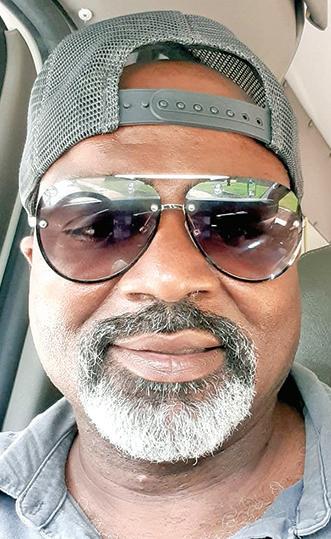
After almost 100 days fighting the virus and its aftereffects, Jana M. Gamble, 33, wishes she were as lucky as survivors like Elvin Chambers.
Gamble was convinced that she had contracted COVID-19 when she lost her sense of taste and smell shortly after Mother’s Day. Several tests later (her first was nonconclusive), her fears were confirmed. She has no idea how she got infected, even though her 15-year-old daughter was hospitalized for 13 days in January with near-acute kidney failure.
Both Covington and Gamble are experiencing high levels of post COVID-related anxiety. This, too, has doctors concerned.
“The link between unemployment, economic shock and suicide is highly replicated in population health,” said Roger S. McIntyre, professor of psychiatry and pharmacology at the University of Toronto.

Although Gamble didn’t know then if it was COVID or not, her daughter and her younger son have since tested positive. Other than her son’s ear infections, Gamble said both kids have been completely asymptomatic.
Gamble is a City of St. Louis resident and vice president of the Michael Brown Chosen for Change Foundation.
From bed she coordinated the organization’s events while grappling with a loss of appetite (she lost 14 pounds in seven days), fatigue, chills,
McIntyre, whose research has been published in Psychiatry Research and World Psychiatry, added, “The anxiety of the virus with the economic shock, along with the physical distancing, is an unprecedented assault on mental health.
Covington, Chambers and Gamble are among the lucky 96-to-98% of people who have escaped death from COVID-19. Each has serious issues with people who aren’t taking the coronavirus threat seriously. They have even less tolerance for the president’s ill-formed declaration about survivors’ recovery. Although research is ongoing, it’s definitely not “totally harmless.”
Sylvester Brown Jr. is The St. Louis American’s inaugural Deaconess Fellow.
the strip of land they stand on. The last of the three structures came down on August 19. On July 9, they had agreed that the billboards would be removed by December. Brandon, 59, has been a cemetery cleanup volunteer since 2016, part of a small group that maintains the overgrown and decaying cemetery.
Washington Park has fallen into disrepair since its days as what Brandon describes as “the most beautiful place African Americans could be buried” in the 1970s. It has passed through the hands of a series of owners who amassed back taxes while failing to maintain the property. DDI Media bought the strip of land along the highway, which abuts several graves, in 1985.
These days, the volunteers work to clear brush and prop up crumbling or overturned headstones, but have not until now been able to do anything about the billboards.
DDI Media, according to Brandon’s organization the Washington Park Cemetery Anti-Desecration League, agreed to remove the billboards “under the observation of a designee of the St. Louis County Office of Diversity, Equity and Inclusion.” They agreed this removal would be done “with little disturbances to graves.”
For Brandon, this project is personal: her mother, who died when she was 5 years old, is buried in the cemetery, as is her grandmother and several other relatives.
“It’s been a battle,” Brandon said. “So many people told me, ‘Oh, they ain’t going to do nothing about those billboards; that’s just the way it is. White people are gonna do what they do.’ But I never let that faze me.”
The billboards have carried fewer and fewer advertise-
Continued from A1
the Get Your Knees Off Our Necks Commitment March. It is scheduled for the 57th anniversary of the historic March on Washington on August 28, 1963, when Dr. Martin Luther King Jr. delivered his “I Have a Dream” speech. Announced by Rev. Al Sharpton during George Floyd’s memorial in Minneapolis, the march is co-convened by Martin Luther King III. Daniels said several

ments in recent months. Since mid-2018, the Washington Park Cemetery Anti-Desecration League has been sending letters to companies that had advertised on the billboards informing them where their ads were placed. Some groups whose advertisements had been placed there, such as the St. Louis Public Library and Blueprint4Summer, expressed concerns over the location of the billboards. At least one company ended up pulling their advertisement purchase altogether.
“The billboards disrupt the peace, beauty, serenity and noncommercial nature of the
other activists from St. Louis will also make the journey.
“This March on Washington shows our commitment to fighting for the oppressed, the marginalized, the neglected people of this country,” Sharpton said in a statement.
“We are tired of the mistreatment and the violence that we, as Black Americans, have been subjected to for hundreds of years. Like those who marched before us, we are standing up and telling the police, telling lawmakers, telling the people and systems that have kept us down for years, ‘Get your knee
cemetery,” Brandon’s 2019 lawsuit said. “They defile and divest the cemetery of its sacred nature. The presence of the billboards serves no public interest and have no relation to, and are in conflict of, the purpose and use of the land as a cemetery.”
As such, Brandon and her
n “I’m excited to be around people who are willing to lay it on the line and stand up for justice. I just want to be in the numbers.”
– Cathy “Mama Cat” Daniels
off our necks.’” The National Action Network, founded in 1991 by Sharpton to promote a “modern civil rights agenda” in the spirit of Dr. King, is organizing the events. Protesters will gather at Lincoln Circle at 7 a.m. Friday,

August 28 to hear the day’s programming before marching at 1 p.m. to the Martin Luther King Jr. Memorial.
“We are in the midst of the largest civil and human rights movement in history,” said Martin Luther King III. “Now
attorney Mary Coffey argued for an injunction that would require all billboards to be removed from the cemetery on graveyard desecration grounds.
In their lawsuit, they argued that regardless of who owns land in a cemetery, that land must legally be used for cemetery purposes.
is the time, and this is the generation that can realize the dream my father spoke of 57 years ago. Black Americans are still bearing the same hardships my father worked to eradicate, and the only way we can hope to see the future he dreamt of is by continuing the peaceful and radical work he began years ago.”
Speakers will include the families of George Floyd, Breonna Taylor, Eric Garner and others to address the senseless loss of Black lives at the hands of police. They will advocate for police account-
“There is common law about cemeteries that says you can’t just decide that a cemetery’s not a cemetery anymore,” Coffey said.
Although the billboards were on DDI Media property and as such not part of Washington Park, it can still be legally construed as cemetery land, as there are undeniably headstones on the land the advertising company bought.
“Once it’s dedicated for use as a cemetery, it has to be preserved that way and the dignity of the place respected,” said Coffey. “So, it was our contention that the billboards were not consistent with the use of the property as a cemetery and were kind of disrespectful to the land’s dedication as a cemetery.”
Vince Miller, president of DDI Media, said in a statement to The American that his company had been involved in discussions with community members regarding the cemetery’s future for “many months,” and had made their own maintenance proposal for the future of the cemetery shortly before they were sued.
“While we had hoped to be part of the solution to address the long-term future of the cemetery, we are not willing to go through ongoing and costly litigation to help,” Miller wrote.
DDI media maintains possession of the contested portion of the cemetery now that the billboards have been removed.
Though the billboards are down, massive sections of the cemetery are still in disrepair – some covered in weeds too thick for a person to walk through. So, Brandon said, the Washington Park Cemetery Anti-Desecration League will continue its work to restore the cemetery to the beautiful resting place it once was.
“I do it for my ancestors,” she said. “I have to be there for them.”
ability, criminal justice reform, voter protection and more.
“Unfortunately, it’s now 57 years later and King’s dream has not been fulfilled,” Daniels said. “Any time anyone gets up to speak truth to power, I’m excited to hear you talk. I’m excited to be around people who are willing to lay it on the line and stand up for justice. I just want to be in the numbers. I just want to be there. Maybe I can bring something back to help uplift the family here.” To register for the march, visit https://tinyurl.com/kneekneck-march.

Schnuck Markets, Inc. teamed up with The Urban League of Metropolitan St. Louis, Inc. to provide support to families in need during this unprecedented coronavirus pandemic.
Schnucks donated $22,000 in food and 5,000 reusable shopping bags for distribution to families at the League’s 20th weekly emergency relief distribution on August,15, 2020 at the former Jamestown Mall.
“Schnucks is proud to partner with the Urban League of Metropolitan St. Louis because we have a shared mission in the fight against hunger and food insecurity,” said Schnucks Director of Corporate External Relations Schron Jackson. “Teammates from across our company will be at the distribution event helping provide local children and families with food and the supplies they need to start the school year.”
Donated items include 2000 cans each of canned vegetables and fruit,

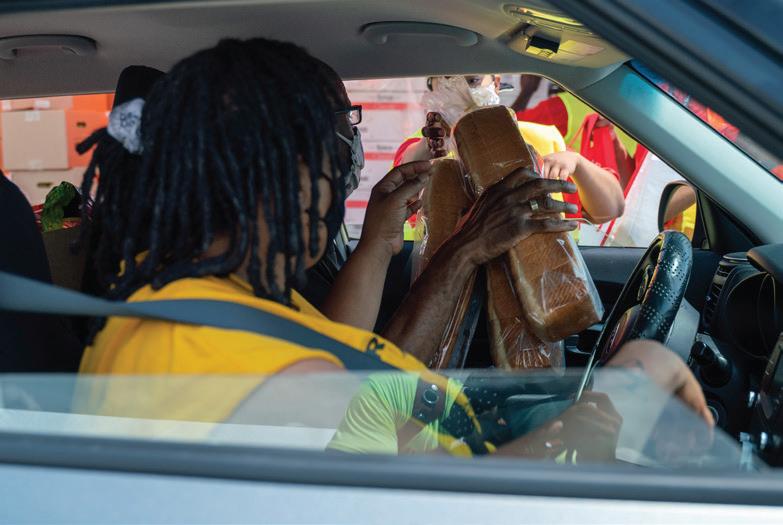
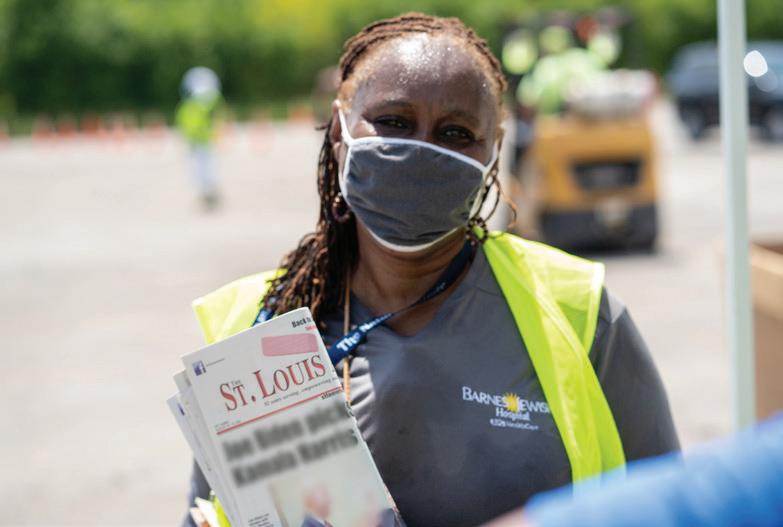

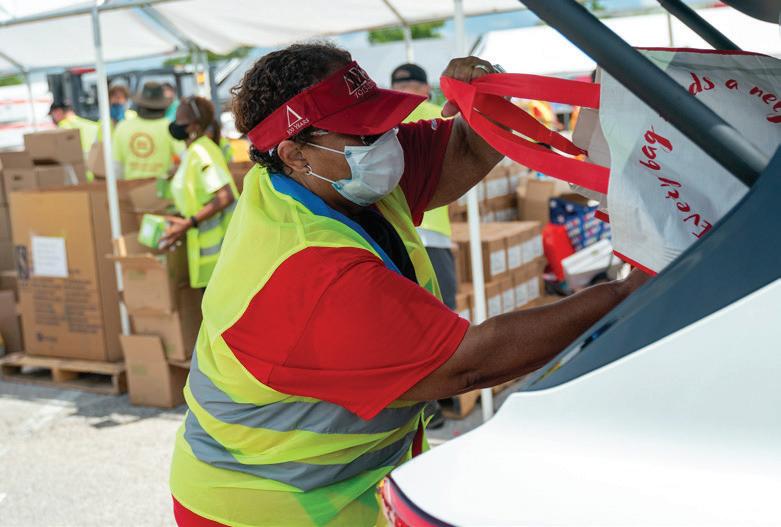


boxed pasta, pasta sauces, breakfast items, and canned soup.
“Unfortunately, we are not seeing a drop in coronavirus cases nor are we seeing a lessening of impact. In fact, we are seeing the opposite with more middle-class families being impacted,” said Urban League President and CEO, Michael P. McMillan. “This generous donation from Schnucks allows us to provide staples to families when they need it most.”
The Red and Black Brass Band serenaded volunteers and families as they waited in line for the opening of the distribution effort. The band has a New Orleans Second Linde style and have gained popularity for providing strolling neighborhood concerts during the pandemic.

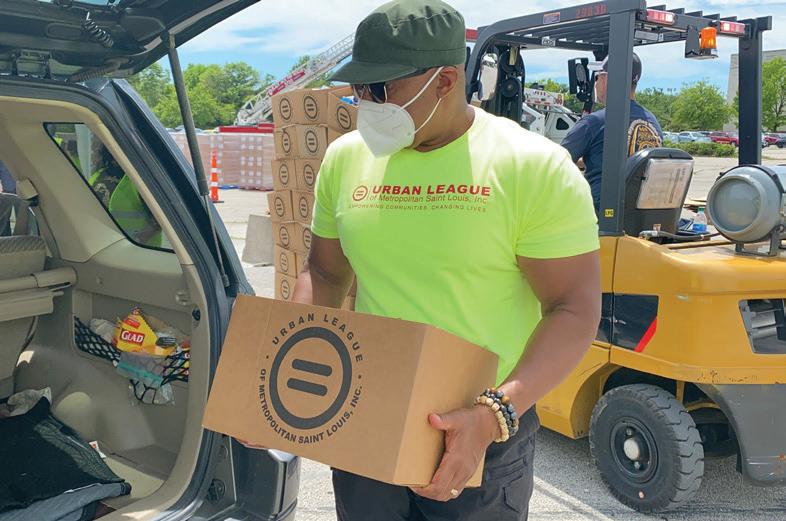

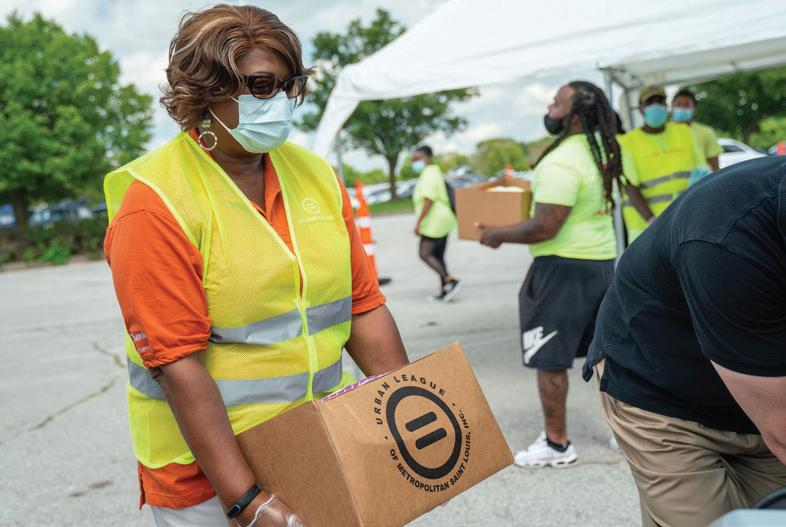
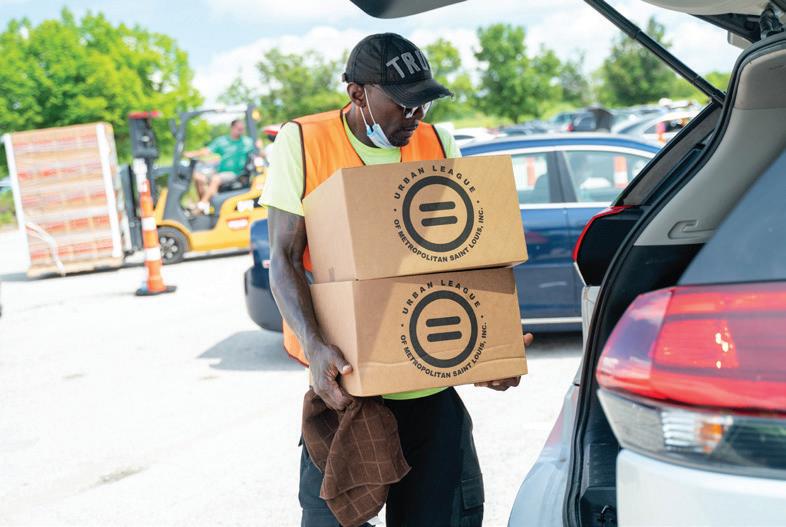

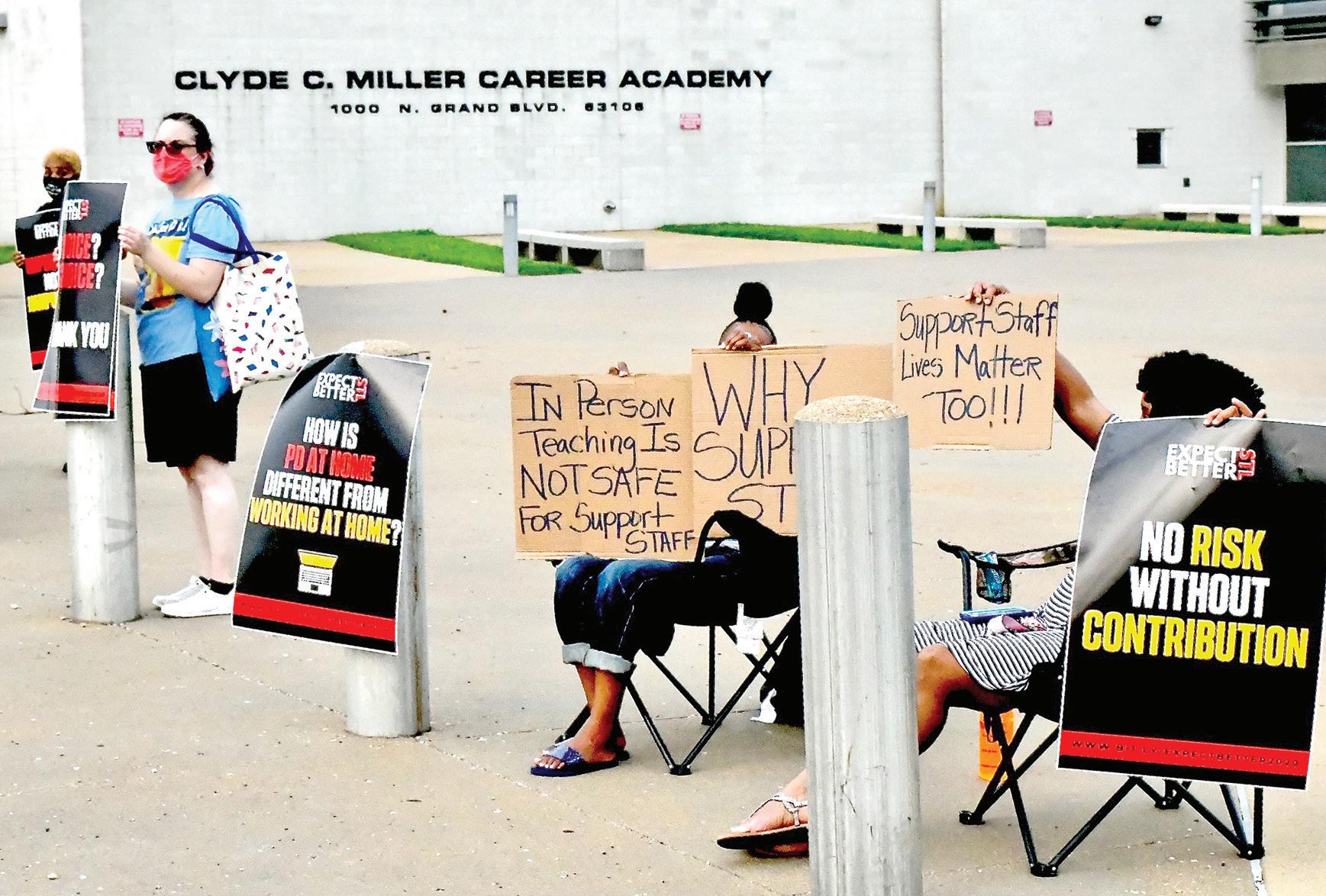
By Rebecca Rivas
American
Of The St. Louis
Evictions are a public health crisis, and Presiding Judge Rex Burlison of the 22nd Judicial Circuit Court should issue an order to suspend evictions until October 1, said the 12-member board that advises the city’s acting health director, Dr. Fredrick Echols.
The Joint Boards of Health and Hospitals voted to recommend that Burlison issue the order during an emergency meeting on Thursday, August 6 at 8 a.m.
At about 3 p.m. on August 6, Burlison issued an order to suspend evictions until September 1. Burlison had already halted evictions through a verbal agreement with Sheriff Vernon Betts on August 3, following The American’s July 31 investigation. However, the board wanted to see an official order with an end date.
Will Ross, the board’s chairman. “There are not a whole lot of options here. Something has to be done.”
n “We have not moved anywhere near where we should be. There are not a whole lot of options here. Something has to be done.”
– Dr. Will Ross
In addition, the board said large venues in the City of St. Louis must scale back to 50% capacity to help reduce the region’s surging COVID-19 hospital admissions.
“We have not moved anywhere near where we should be,” said Dr.
On August 12, Echols signed a health order that includes the board’s suggestion, as well as scales back the capacity of restaurants and bars to 50% percent, effective at 12 a.m. on August 13.
The board also voted to support Echols’ decision to forego fall school sports.
Since July 6, St. Louis’ major healthcare systems have reported “troubling” numbers of new hospital COVID patients.
“We have too much virus spreading in the community,” said Dr. Alex Garza, incident commander for the St. Louis Metropolitan Pandemic Task Force, in his August 5 briefing. “We are far from out of the woods. There is a lot on the line here, but it’s not going to slow down until everyone steps up and does the right thing.”
On August 4, the task force reported 55 new hospital admissions in a single day. Since August 2, the seven-day average of
‘A
n “These unprecedented attacks on the U.S. Postal Service will disenfranchise voters of color, who are already more harshly impacted by coronavirus.”
– NAACP
and legitimacy of our elections,” the NAACP stated. “It must not stand.” On August 13, Trump vowed to block emergency funding of $25 billion for the U.S. Postal Service necessary to allow it to handle and process expected enormous increases in mailed ballots as a result of the coronavirus crisis. Trump has blatantly attacked voting by mail generally, repeating false claims that mail-in ballots lead to fraud, which have been

By Kathy Conley-Jones For The St. Louis American

The members of National African American Insurance Association (NAAIA) St Louis chapter were more than elated to hear the exciting news about U.S. Senator Kamala Harris (D-California). She got the nod and accepted the opportunity to become the first Black woman as the vice-presidential candidate. This moment is not lost on the journey that we Americans of African descent and especially women have witnessed to date. We as a community have faced a pandemic of Biblical proportions, economic disparity and insecurity, and injustices towards Black lives. The lack of government leadership has offered no solutions, no justice and no peace. But God always offers us a sliver of light ... a ray of hope in our darkness. Our forefathers and foremothers fought and died for the opportunities that each of us now enjoy as members of insurance and financial services industry. Our destination is to serve and uplift our communities of color through financial empowerment. Our journey as African-American insurance professionals is intertwined with our ancestors’ hope to create a better tomorrow. That hope is similar to that of Harriet Tubman while she helped freed slaves or how Frederick Douglas endured many trials speaking truth to power. We cannot forget the audacity of U.S. Representative Shirley
See HARRIS A10

Vanessa Charlot is new CEO for Meds & Food for Kids
Vanessa Charlot is the new CEO for Meds & Food for Kids.

Vanessa Charlot
Most recently, she was the managing partner of a successful microcredit business in the north of Haiti. Previously, she served in the U.S. Army, obtaining the rank of first lieutenant, and taught in the U.S. Army Officer Candidate School. She is also a professional photographer, whose work has been published in Vogue, The New Yorker, The Atlantic and other national publications.
A first-generation Haitian American born in Florida, she recently relocated to the St. Louis area. She received her Bachelor of Arts in English Literature and Sociology from Florida Atlantic University and a Master of Educational Administration from Concordia University.
She succeeds Patricia B. Wolff, MD, founder, who remains senior advisor.
Continued from A9
new hospital admissions has remained above 40 — and on Wednesday was 44 — which is well into the task force’s Red Zone.
“That’s when we start to become really concerned with the number of people coming into our hospitals,” Garza said.
The city’s health order on large venues states that Echols would revise the capacity limits if the number of new hospital admissions exceeds 40 per day for three of four consecutive days or reaches a seven-day moving average of 35 new COVID-related admis-
Black realtors attack HUD for revoking Obama-era fair housing rule
The recent revocation of the Affirmatively Furthering Fair Housing Rule by the U.S. Department of Housing and Urban Development (HUD) represents the sanctioned return of segregated housing, according to the National Association of Real Estate Brokers (NAREB), the country’s oldest minority real estate trade association.
“HUD’s action sets fair housing policy back more than 50 years and stands to undo decades of progress to achieve democracy in housing,” NAREB president, Donnell Williams stated. In 2015, the Obama Administration issued the Affirmatively Furthering
Fair Housing Rule requiring HUD grant recipients (states and localities) to examine fair housing policies on the basis of race. The rule further required that the states and localities address any measurable bias. The intent of the rule was to take a proactive role in enforcing fair housing policy under the Fair Housing Act of 1968.

Donnell Williams
The new rule entitled, “Preserving Community and Neighborhood Choice,” allows states and localities to have final say whether their policies are “furthering fair housing.” and will have very little guidance, or even

sions. Those thresholds have been reached.
“We continue to see an increase in positive cases in the City of St. Louis, particularly among young people who often times show no symptoms,” Mayor Lyda Krewson said.
“And while they might not always have the underlying health conditions that can land them in the hospital for an extended period of time, they still present a significant risk of infecting others. Our intent here is to ensure the maximum number of people and businesses take prudent precautions to reduce the exposure to, and slow the spread of, COVID19.”
St. Louis County Executive Dr. Sam Page has restricted
gatherings to no more than 50 people, mandated that bars close at 10 p.m., and rolled back business occupancy to 25% — all which went into effect on July 31. However until now, no other regional leaders on the Missouri side have not followed Page’s lead. Krewson and Page mandated wearing face masks indoors on July 3, but surrounding Missouri counties have not done that.
St. Louis Alderwoman Christine Ingrassia (D-Ward 6) tuned into the board meeting on August 6 and was disappointed that the Joint Board did not recommend tighter restrictions.
“The numbers keep telling us that what we are doing is not working,” Ingrassia said. “We

incentive to ensure that fair housing policies are indeed protecting the rights and interests of Black and other Americans who have been, or may be discriminated against in the future.
“The new replacement rule represents yet another setback in the struggle to close the racial wealth gap, and it thwarts the growth of Black homeownership,” Williams stated.
For decades, local governments had racial covenants that prevented Black Americans from buying properties in certain neighborhoods.
These racially discriminatory efforts were augmented by redlining of Black neighborhoods by various federal agencies and lenders.
St. Louis was home to a landmark 1948 case overturning racial covenants, Shelley v. Kraemer, where the U.S. Supreme Court ruled that it violates the 14th Amendment when state courts enforce them.
“In spite of these obvious attempts to roll back the clock,” Williams stated, “NAREB will continue to serve as the champions of the communities we serve as well as the conscience of the real estate and mortgage lending industries.”
Maryville University has reduced tuition 5% for traditional undergraduate on-campus students beginning in Fall 2020. Undergraduate on-campus tuition at the university has been flat for the past four years.
“Tuition reduction allows students and families to plan out a more affordable path to their Maryville education, which has some of the best outcomes in the nation including a 97% career outcome rate and an 84% retention rate,” said President Mark Lombard.
Maryville’s tuition and fees cover all course materials, a new iPad with over 200 learning apps, and one of the most connected campuses in the U.S. Lombardi said, “Maryville is leveraging its enrollment growth and technological investments to pass along savings to the student.”
need to put tougher restrictions in place, so we can get back to a place where the numbers aren’t increasing at the pace that they are.”
Ingrassia said she and a number of other aldermen are getting calls from small businesses, saying that the lack of guidance makes for a lot of uncertainty.
In Illinois, Gov. J.B. Pritzker released a mitigation plan on July 15 that includes closing indoor service at restaurants and bars in areas with testing positivity rates above 8%. On August 4, Garza reported that the region’s positivity rate is 11.1%. The City of St. Louis was at 9.3% as of July 19.
Currently, St. Louis businesses have no marker or threshold that they can watch to know what’s coming, Ingrassia said.
“I like what Illinois is doing because there is a plan and process in place, so you know
Continued from A9
what to expect,” Ingrassia said. “Right now, there’s the uncertainty of when to expect further restrictions.”
Having clear thresholds would help small businesses know how much perishable food they should purchase, for example. A number of aldermen would like to see a more comprehensive mitigation plan, she said.
The Board of Aldermen’s Coronavirus Special Committee could meet to issue a resolution to urge the health department to develop such a plan. Ingrassia said she already has put in several requests to Board President Lewis Reed, who chairs the committee, to call a meeting so they could address how the CARES Act funding is being spent, as the ordinance mandates. She said she has not yet received a response.
In regards to evictions, Krewson told the board that they received 4,000 applications for the $5.4 million in
Chisholm (D-New York) to dare run as a Black woman for president of this land. What about the hope that Maya Angelou channeled through her powerful words calling out the “phenomenal woman” in each of us? Our beloved 44th president of the United States, Barack Obama, proved to the world that “yes, we can!” Our journey has not only been one of overcoming adversity, but giving hope to generations to come. Senator
Continued from A9
widely disproven. Trump has specifically stated that allowing voting by mail would harm his reelection chances.
Trump’s most blatant attack yet on our democratic process comes on the heels of drastic changes to the delivery of U.S. mail that are certain to obstruct a free and fair election.
Trump’s newly installed Postmaster General Louis DeJoy, who has contributed millions to Trump’s campaign
and the Republican Party, has purged top officials in the postal service and instituted sweeping operational changes to impair the delivery of mail and undermine the November 3 election. These changes include cutbacks in the number and use of mail processing equipment, declassifying election mail as first class, altering mail sorting and delivery policies, restricting mail delivery, and reducing overtime for postal workers.
“These unprecedented attacks on the U.S. Postal Service will disenfranchise voters of color, who are already more harshly impacted

CARES Act funding for rental and mortgage assistance Of those, 1,500 applications were from St. Louis County residents.
“We’re working with about a dozen entities, including Catholic Charities, Gateway 180, International institute, in order for them to process the 3,000 applications quickly,” Krewson said. “Yesterday every city resident has gotten an email and the next thing you’ll hear is what agency you’ve been assigned to.”
Krewson said they will work closely with Judge Burlison to put these funds in the hands of people who are facing evictions.
“We are working a very coordinated effort through this mortgage assistance,” she said. “The average amount of the ask is $1,500. That will likely go up. We need to find additional funds to go into that.”
Kamala Harris: the journey continues, and the NAAIA St Louis Chapter and our allies are proud to support you every step of the way.
Kathy Conley-Jones is vice president of NAAIA – St. Louis chapter and president of the Conley Financial Group.
by coronavirus and require alternative methods to in-person voting in order to protect their health and safety,” the NAACP stated. Many states rely on deadlines for requesting and returning absentee ballots within days of Election Day. It is imperative to have a fully functioning postal service prepared to follow standard delivery times to ensure all votes by mail are counted.
“We are sounding the alarm bell: Our democracy is in crisis,” the NAACP stated. “We call on members of Congress from both sides of the aisle to condemn the hijacking of one of our most revered institutions, the U.S. Postal Service. We call upon Congress to pass emergency funding for the U.S. Postal Service by a vetoproof majority. We call upon Congress to immediately exercise desperately needed oversight to ensure that delivery of mail in connection with the November 3 election is unimpeded and untainted by partisanship and an overt attempt to steal this election.”
The NAACP sounded the alarm less than two and a half months before the election.
“We have fought too long and too hard to fully participate in our democracy to allow it to be subverted in this heinous and scandalous manner,” the NAACP stated. “The American people need our leaders to keep our democratic institutions intact and fully operational at any time, and especially now.”

Just two weeks after his victory in the August 4 Democratic primary election, St. Louis County Executive Dr. Sam Page fired Hazel Erby as the leader of inclusion for the county.
“I was just relieved of my duties as Director of Diversity, Equity, and Inclusion,” Erby wrote in a tweet at 5:54 p.m. on Tuesday, August 18. “@ DrSamPage said ‘I do not need you on my staff anymore’!!”
In the following tweet, Erby wrote, “I will not be silent! Blacks are NOT valued in this administration, particularly Black women!”
When asked about his move to fire Erby during his August 19 press briefing, Page said Erby was the right person to be the first director of the Diversity, Equity and Inclusion Office.
“Now I am looking for more focus and the ability to accomplish even more,” he said.
Page is replacing her with civil rights activist Kenny Murdock, who worked in the inclusion office as manager of the implicit bias training program. He has trained county police officers in implicit bias. Prior to that, he oversaw the county’s equity plan in the Office of Strategy and Innovation.
Murdock said he will “create programs that help the community communicate well with the government,” as well as help county departments better communicate around identity.
Murdock was a full-time paid campaign field guide in Page’s recent primary campaign, he said, and he was deputy campaign manager during Page’s failed bid for lieutenant governor in 2007.
State Rep. Kevin Windham (D-St. Louis County), said, “It doesn’t look good; it doesn’t feel good,” for Erby to be fired two weeks after an election, where an organization she has closely aligned with — the Fannie Lou Hamer Coalition of Black Democrats — endorsed Page’s opponent Jake Zimmerman. And then Page replace Erby his previous campaign manager. Black elected officials said this looks political and “petty.”
“It doesn’t smell good,” Windham said. “And, he’s firing a 74-year Black woman in the midst of a global pandemic.” Page told The American that he knew his decision was going to be controversial in “some circles.” In regards to Erby’s possible support for Zimmerman and possible retaliation, Page said, “Hazel told me she was staying out of the election, and I encouraged all of my staff to do the same. And as far as I know they did that.”
The American did not receive a response from Erby by press time regarding Zimmerman’s campaign.
Erby, who had been a champion for racial equity on the St. Louis County Council for 15 years, resigned from her council position to become the inclusion director after Page became the interim county executive in spring 2019 following Steve Stenger’s criminal indictment.
Erby had voted against Page becoming interim county executive because she said that she was the council’s senior Democrat in line for the position. However, she and Page agreed to move forward as a team, they said at the time. As inclusion director, Erby was in charge of overseeing some of the initiatives that she championed as a councilwoman, including minority participation and the creation of a North County recreation center. However, over the past several months, things began to unravel.
In April, Erby and her
team called into question why African-American contractors were excluded from the $1.67 million temporary morgue that was built as part of the county’s COVID-19 response. Despite a county law requiring that 24% of contract dollars go to minority-owned business enterprises (MBEs) — a law that Erby championed — less than $1,000 was awarded to Black contractors, a joint investigation by The St. Louis American and Type Investigations found. Erby’s office oversaw compliance of the 2018 inclusion law, and her team was not informed about the morgue’s construction, in violation of protocol.
Erby also called into question why the on-call contracts, or contracts for contractors in times of emergency, that are renewed every year did not include the minority participation requirements. Page told The American that excluding these emergency contractors from the inclusion law was a mistake that they have now learned from.
Recently, Page removed Erby from having any involvement in compliance in the construction contracts, she said. Erby said she believes it was because Page was pressured by county contractors who didn’t like the new minority participation requirements.
However, in an August 17 email to Erby, Page wrote that she had consistently said she didn’t want to oversee that aspect of inclusion.
“In several meetings last week, you shared your excitement regarding the future without feeling responsible for the M/WBE program” (minorityowned and women-owned business enterprises), Page wrote in an August 17 email. “I hope you still see the important role for a strong leader in diversity, equity and inclusion efforts that transcend the M/WBE program.”
This was in response to Erby’s April 12 letter to Page. The two were also recently butting heads about budgetary needs for the inclusion office.
“It has been communicated by yourself, the County Council chair and the Oversight Committee that putting equity first is a top priority,” Erby wrote.
“This has not been the case in the current or proposed budget, and it has not been reflected in the resources provided to carry out the numerous

requests of the office to date.”
When Page called her just half an hour before her tweet, she said she thought they would be able to talk about this and other issues. Instead, he told her that he was letting her go, even though he said she had done a good job as director, Erby said.
Back when Erby was selected for the position, many advocates in the community were hopeful at the potential change she could bring.
“You know she’s not going to back down from the fight, and that’s what we’ve been needing for a long time,” Adolphus Pruitt, president of the St. Louis City NAACP, said at the time.
“When you look at her experience with the County Council for 15 years, she knows where the wrongs are buried and where the inequities have occurred most often. Also, the employees of St. Louis County have just gotten the strongest advocate that I can think of in the county’s history.”
Upon hearing the news, Pruitt said that it is sad that county politics is the way that it is – “because at the end of the day,” Pruitt said, “that’s what this is all about.”
Fox in the hen house?
Page announced five appointments on August 19, including making Nate Adams the acting director of the county’s M/WBE program. Adams has worked for more than 30 years in the construction industry and M/WBE programs. Page has also taken the M/ WBE program out of the diversity office and put it in under the procurement division.
While this was outlined in the inclusion law, it has also been a grave concern that the
minority participation team has continuously raised to Page, for good reason. For anyone who knows how the minority participation process works, this is essentially putting Adams alone – where there was previously a team of four – in the middle of the lion’s den.
“It doesn’t bode well with it being pushed down in the organization,” said Jack Thomas, who was the county’s first acting director of the M/ WBE program and who hired
Adams. “It’s a question of independence. How do you have the person who is over the purchasing also over the M/ WBE Office, who will make recommendations of whether or not those contracts go through?
That’s not a good look. You have the fox watching the hen house.”
Thomas added that the morgue project is a great example of why this doesn’t work.
The American’s June investigation details the hostility that
Thomas



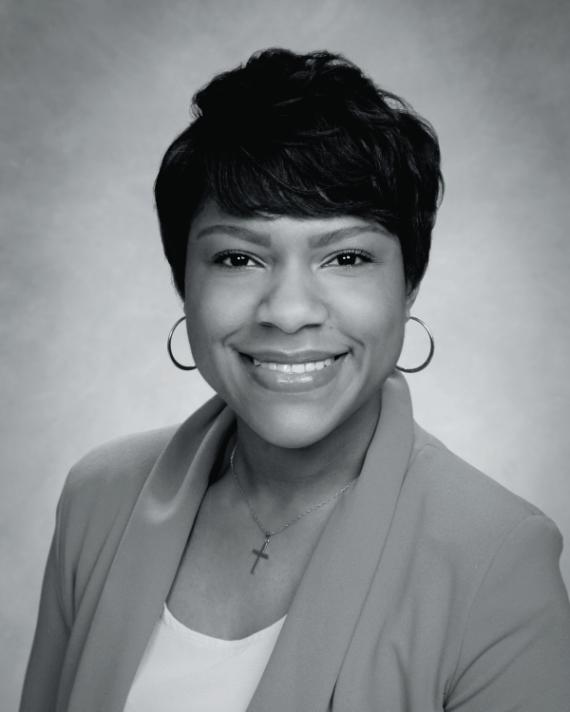

“TakingCareofYou”
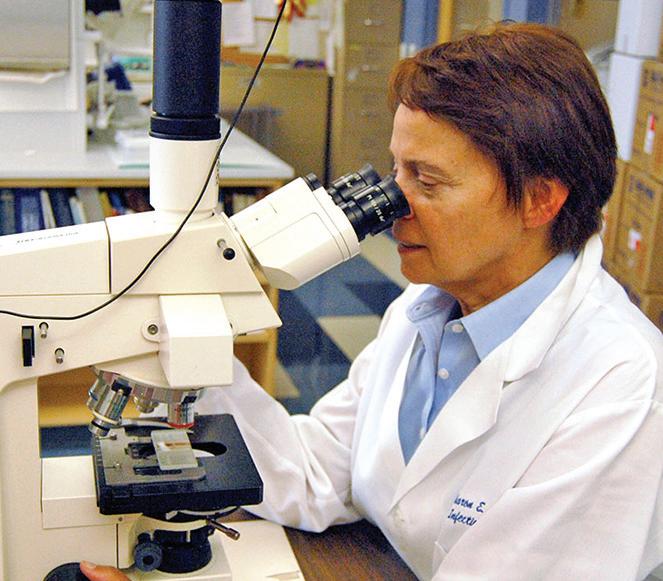
“It
is vital that we conduct careful scientific studies to learn if vaccines can prevent illness and stop future outbreaks, especially in our most vulnerable and at-risk populations,” said Sharon Frey,
M.D.
Researchers struggle to enroll Blacks, who are most impacted by the pandemic, in study
By Rebecca Rivas
Of The St. Louis American
Saint Louis University researchers are enrolling volunteers in a trial to study a vaccine against SARS-CoV-2, the virus that causes COVID-19 disease. But will they be able to enroll enough African-American participants, given the skepticism that historical unethical experiments have created among minorities?
“It’s very difficult right now because of all of the mistrust, which has rightfully developed because of past egregious examples of exper-
imenting on minority groups — and in particular African Americans — in prisons and things like that,” said Dr. Daniel Hoft, who is leading the trial at SLU’s Center for Vaccine Development.
African Americans in the St. Louis region are dying from COVID-19 at four times the rate as non-Black residents. They are also four times more likely to test positive for COVID-19 than non-Black hospital patients. Knowing these statistics, Hoft said that it is crucial that researchers study the impacts of the vaccine on the populations
most affected by the pandemic.
SLU’s phase 3 clinical trial focuses on a vaccine co-developed by scientists at Moderna and the National Institute of Allergy and Infectious Diseases (NIAID) Vaccine Research Center.
Both Washington University School of Medicine and SLU are participating in the trials as a part of the COVID-19 Prevention Network, a newly organized network formed by the NIAID to develop and test
See VACCINE, A13
By Denise Hooks-Anderson, M.D.
Of The St. Louis American
Though local governments are lifting restrictions as it relates to COVID-19, the virus has not magically disappeared as one particular politician erroneously led folks to believe. Scientists are predicting the U.S. could reach approximately 200,000 COVID deaths by the fall.

As local hair salons, nail shops, and restaurants reopen, where does that leave houses of worship? Temples, mosques, and churches of all kinds will have to rethink and reconfigure their services in order to protect their parishioners.
The CDC has developed a “Frequently Asked Question” section to prepare churches as they reopen their facilities. A few of the recommendations are listed below.
n Hugging, kissing, and handshakes, which are all common displays of affection in church, will need to be avoided.
The first step in reopening a church is proper preparation. Churches should develop a COVID Prevention Strategy. This strategy per the CDC should include a plan to alert health officials if the church notices an increase of absenteeism or members reporting upper respiratory illnesses since these symptoms can mirror symptoms of COVID. Staff and members should be reminded to stay home when sick. Personal protective equipment should be readily available for staff to keep them safe. The CDC also recommends that all members wear a mask if over the age of 2. Members and staff should be encouraged to wash their hands frequently or use hand sanitizer. Having hand sanitizer and soap readily available is also recommended.
Highly visible reminders about coughing into the bend of your arm, avoiding contact with your face, washing hands, and using hand sanitizer with a minimum of 60% alcohol should be hung all over the facility. The CDC website actually has a link that church leadership can access that provides posters with the aforementioned recommendations.
Churches will also have to clean the facili-
See COVID, A13
By Sandra Jordan
Of The St. Louis American
St. Louis County Executive Dr. Sam Page and Betty Jean Kerr People’s Health Centers CEO Dwayne Butler welcomed the reopening of the People’s Health Center located in the Ferguson Schnucks Market at 49 North Florissant Rd. as a COVID-19 Mitigation Outreach Program on Monday, August 17. The clinic, officially known as People’s Healthcare Services by Home State Health, had been closed since the beginning of the pandemic. “People’s has been a great partner in responding to this crisis, which has affected so many of our residents,” Page said. “Through these collaborative efforts, we can continue
Will be a COVID-19 Mitigation Outreach Center n “We’ll also be encouraging the community to get back engaged with their primary care doctors.” – Betty Jean Kerr People’s Health Centers CEO Dwayne Butler
serving more people during this challenging time.” City officials, including Ferguson Mayor Ella Jones and Ferguson Police Chief Jason P. Armstrong, were on hand for the official See PEOPLE’S, A13


“TakingCareofYou”
Continued from A12 vaccines and treatments in the fight against COVID-19. Researchers at the two universities expect to enroll about 3,000 participants in several COVID-19 vaccine trials, with each school participating in different trials. Washington University will be opening enrollment for a different vaccine trial soon.
In the entire region, 18.8% of the population is African American. But so far, the volunteers in SLU’s Moderna trial do not reflect this number, Hoft said.
“We have to do better,” Hoft said. “We want to do better.”
However, if researchers at WashU and SLU want African Americans to participate,
there are going to have to be some “real conversations” about the past, said Rebeccah Bennett, who is the community engagement and outreach lead for PrepareSTL — the joint protection and education campaign for the City of St. Louis Department of Health and the Saint Louis County Department of Public Health.
“That is a longer community conversation,” Bennett said. “The conversation has to look back to look forward. There is so much material there and a whole lot of mistrust.” Bennett said AfricanAmerican women within her own family were sterilized without their consent. A federally funded study on syphilis, known as the Tuskegee Experiment, lasted four decades, where black men were told they were receiving treatment for syphilis but instead were just given placebos —
n “That is a longer community conversation. The conversation has to look back to look forward. There is so much material there and a whole lot of mistrust.”
– Rebeccah Bennett, PrepareSTL
even when a good treatment was eventually discovered.
“We have to talk about the mistrust,” Bennett said. “We have to contend with the medical abuse, and all of that meets squarely with the fact that many clinicians believe that African Americans should get the vaccine first because of our disproportionate risk. If we are unwilling to have these reckoning conversations publicly, then I don’t think these trials will get the participation from the
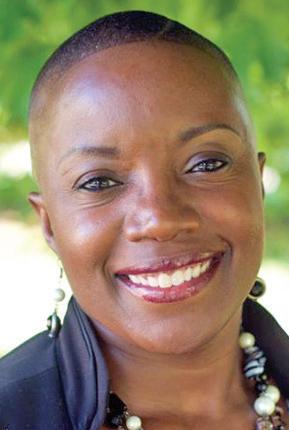
Black community that they are hoping for.”
Researchers also said it will be critically important to enroll participants who are likely to be exposed to COVID-19 or those at risk for severe disease from COVID-19, including participants over age 65.
“A safe and effective vaccine that will protect against COVID-19 is our best hope for ending the current pandemic,” said Sharon Frey, M.D., clinical director of SLU’s Center
for Vaccine Development and principal investigator of the Moderna trial at SLU. “This is why it is vital that we conduct careful scientific studies to learn if vaccines like this one can prevent illness and stop future outbreaks, especially in our most vulnerable and at-risk populations.”
Researchers will evaluate the vaccine in adults 18 years and older who have no known history of infection with SARS-CoV-2. Those in the study will be randomly assigned to receive the mRNA1273 vaccine, co-developed by scientists at Moderna and the NIAID Vaccine Research Center, or a placebo, which will be given in two injections, 28 days apart.
Participants cannot contract COVID-19 from the vaccine and will not be deliberately exposed to the virus, Hoft said. Participants are encouraged to
still be cautious and follow all the social-distancing guidelines and wear masks, he said. About 600 people have received the vaccine in Phase 1, Hoft said, and some experienced the side effects of not feeling well, particularly after the second injection. “But it was not so bad that they couldn’t go to work,” Hoft said. “And we don’t know if those side effects were in the placebo group or not.”
Study participants will provide nasal and blood samples and may have up to seven scheduled clinic visits over the course of two years as researchers monitor their immune response. Participants will be compensated. To learn more about participating in the COVID-19 vaccine trial at SLU, visit vaccine. slu.edu and complete the questionnaire or call 314-977-6333 or 1-866-410-6333.
By Robert Lawrence Salter
For The St. Louis American
Pharmacists are the most trusted group in the health care industry, according to a recent survey. The survey found that patients have more trust in people who directly provide their health care. It should be no surprise then, that pharmacists receive continued high ratings by Americans for their honesty and ethical standards. Further, studies have shown that pharmacists, with 6-7 years of college education, are the most underutilized member of the primary healthcare team.
A majority of Americans come into regular contact with pharmacists, and their high ratings speak to putting the patient’s needs first and foremost. In that context, we should look to pharmacists to take on a new and lifesaving role in the changing landscape of value-based healthcare delivery: suicide prevention.
Suicide rates are increasing, rising rapidly especially among African American and veteran groups. But most suicides can be prevented with timely interventions – and this is where pharmacists can play a crucial role.
Research has shown that most persons who commit suicide are users of anti-depressant medications – legally prescribed by a physician and
Continued from A12
“The re-opening of our Ferguson Schnucks clinic, in partnership with Centene, Home State Health, Schnucks and the County, will allow us to expand access to testing in North County and reinforce the mitigation steps necessary to avoid getting the virus in the first place,” Butler said.
“This COVID mitigation and testing program is a natural extension of our original
Continued from A12
ty and commonly used surfaces such as door knobs, handles, light switches and countertops frequently. Common disinfectants can be utilized. Trash will need to be emptied daily.
dispensed by a pharmacist. This is not to say that all who uses anti-depressant medications are potential suicide victims; however, studies have shown that there is a direct correlation in risk assessment. Accordingly, then, pharmacists are in a unique position to be first responders to persons at risk – if they had training in suicide prevention techniques and could take the time to ask, probe and refer. There five things that pharmacists can do as first responders: • identify at-risk patients. Because pharmacists regularly dispense antidepressants, they are in a unique position to identify patients who may be struggling with suicidal thoughts.
immediately discuss these thoughts with their primary care or mental health provider.
• refer to suicide prevention resources. There are a number of tools and resources available for both patients experiencing suicidal thoughts and those concerned that a patient, friend, or loved one may be suicidal.
n Because pharmacists regularly dispense antidepressants, they are in a unique position to identify patients who may be struggling with suicidal thoughts.
• monitor medication uses and mental health. If pharmacists observe any changes in how a medication is taken or prescribed, then they should learn the reasons behind them.
• collaborate with the health care team. Patients who have divulged thoughts or a plan of self-harm/suicide should be strongly encouraged to
mission to provide expanded access to the high-quality health care services and advocacy that Ferguson and North County deserve.”
• engage by being encouraging and empathetic Pharmacists should listen carefully and attentively if and when patients open up about any suicidal thoughts.
There is one death by suicide in the U.S. every 12 minutes, which is not only tragic for the victims but also devastating for the family. The impact of the suicide is, to some extent, informed by the family’s function (or dysfunction) prior to the suicide. Moreover, the suicide may affect family communication and the developmental processes of children. Marital breakup is also more common in parents of children who died by suicide. But there is hope. Suicides can be prevented.
Better Health.
However, no COVID-19 testing will take place at the Ferguson clinic.
Pharmacists Preventing Suicides (PPS), a not-for-profit Missouri corporation, has been established to train health professionals – pharmacists, in particular – in proven intervention techniques designed for persons at risk of taking their own lives.
Founded by the late Dr. Patrick Tharp seven years ago, PPS has conducted numerous community education seminars and has worked closely with St. Louis College of Pharmacy, in establishing suicide prevention training as part of its 7-year PharmD curriculum. Also, PPS has established an annual $2,500 scholarship at the college for a last year pharmacy student who has either volunteered at a suicide prevention organization or has had a personal experience with suicide in their own family.
However, more help is needed from the community for PPS to fund these activities and to lobby the state Legislature to reimburse pharmacists for time spent in counseling persons at risk. PPS has determined that reimbursement for pharmacist counselling time is equally important as the pharmacist training in suicidality.
Clearly, creating a new role for pharmacists is a massive undertaking but PPS believes, it can be done. One life lost to suicide is one too many.
don’t forget chronic illness and primary care as we address the issues of COVID,” Butler said.

clinic site a few years ago to help address the health disparities in Ferguson and surrounding communities.
At the reopened clinic, residents can get free masks and gloves provided by the St. Louis County Department of Public Health; obtain information on COVID-19 drive-through testing sites and COVID-19 educational information; make medical appointments to other People’s locations; and get access information on insurance options, such as Marketplace Screening, Medicaid and Gateway to
gatherings. For instance, many businesses upon reopening can only operate at 25-50%. COVID-19 has already shown us how quickly information changes. Therefore, it is necessary to stay abreast of the latest, evidence-based recommendations.
Churches should also stay up-to-date with local, state and national guidelines as it relates to hosting events and large
Some activities within worship will also have to change. Frequently shared items like Bibles and hymnals should be removed. Children’s ministries will need to be adjusted or reopening.
People’s was able to reopen the clinic after the county recently awarded PHC with a $578,000 CARES Act grant to enhance testing capacity in North St. Louis County, making drive-through testing sites possible. Drive through COVID-19 testing is available from 1-4:30 p.m. every Friday at Betty Jean Kerr People’s Health Center’s North County site, located at 11642 West Florissant Ave.
“It’s important also that we
canceled. Communion delivery will also need to be altered because members should definitely not be sharing the chalice. Hugging, kissing, and handshakes, which are all common displays of affection in church, will need to be avoided. It is also important to remember that influenza season is around the corner. This is not the year to skip your flu shot. As you may recall, symptoms of COVID-19 mirror
“We’ll also be encouraging the community to get back engaged with their primary care doctors. We’ll be making appointments for those who would like to have appointments with primary care doctors. Because we’re going to have to deal with COVID and make sure we are taking care of our health so that the long-term health of the community is addressed and handled.”
People’s partnered with Schnucks and Centene and Home State Health to open the
those of influenza: fever, chills, and muscle aches. Therefore, church leadership should encourage their members to get their influenza immunization as soon as it is available.
With all this in mind, though many parishioners are excited about returning to regular worship, churches may want to consider continuing with virtual service. Many churches have older congregations who have all sorts of chronic illnesses such as hypertension, diabetes,
Nathan Landsbaum, CEO of Home State Health Plan, said another partnership with People’s involves supplying COVID-19 test kits for the health centers.
“We provide a thousand Quest COVID-19 test kits each week,” Landsbaum said. “Home State Health will continue to do our part and be a good partner in the community to provide those COVID-19 testing kits, because it’s so critical in this time.”
and past cardiovascular events like strokes and heart disease. These underlying conditions increase the risk of being infected with coronavirus.
These past few months have definitely been emotionally draining, and I am certain that everyone, myself included, is eager to return to our houses of worship. During times like these, we long for the comfort of our earthly spiritual leaders and small group facilitators. However, we must not rush
Butler said, “Ultimately our goal is to educate the community on the importance of wearing masks, how to wear a mask, washing hands, and doing all the things we can control to ensure we never bring COVID into our homes in the first place.” For more information on the COVID-19 Mitigation Outreach Program at the Ferguson People’s clinic, call 314-633-8921. For individual or group mobile testing on location, by People’s Health Centers, call 314-627-5405
back without properly weighing the consequences of such a decision. After all, it is just a building. We are the church and, as we look around us, there is plenty of work to be done outside of those four walls. Denise Hooks-Anderson, M.D., is associate professor of SLUCare Family Medicine and the medical accuracy editor of The St. Louis American. Email her at yourhealthmatters@ stlamerican.com.
Two parties garnered less than 1K votes between them in uncontested primaries
By Chris King Of The St.
Louis
American
In reporting on the primary victory of Dr. Sam Page, Democratic candidate for St. Louis County executive, on August 4, The American noted that “Page will have competi-
tion in the November general election. However, he got more votes in the Democratic primary than the winner of the Republican primary (Paul Berry III) while getting less than 40% of the Democratic votes cast.”
Carol Jackson, campaign manager for Elizabeth (Betsey)

Mitchell, Green Party candidate for county executive, objected that Page and Berry were reported as the only two candidates for county executive in November.
In fact, there were two other (uncontested) primary races for county executive, Mitchell with the Green Party and Theo Brown Sr. with the Libertarian Party. They also will be on the ballot on November 3.
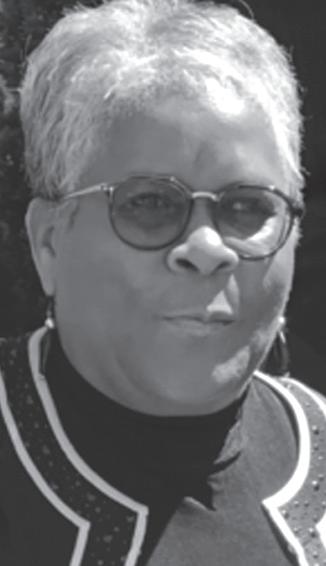
Here is a complete account of the unofficial final vote totals in the August 4 primary.
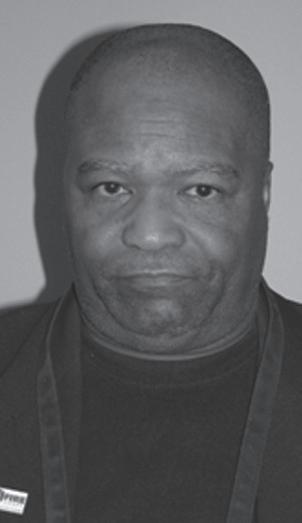
Page won a contested Democratic primary with 70,954 votes; a total of 186,190 votes were cast for a Democrat.
Berry won a contested Republican primary with 28,910 votes; a total of 49,867 votes were cast for a Republican. Brown won an uncontested Libertarian primary with 742 votes.
Mitchell won an uncontested Green primary with 199 votes.
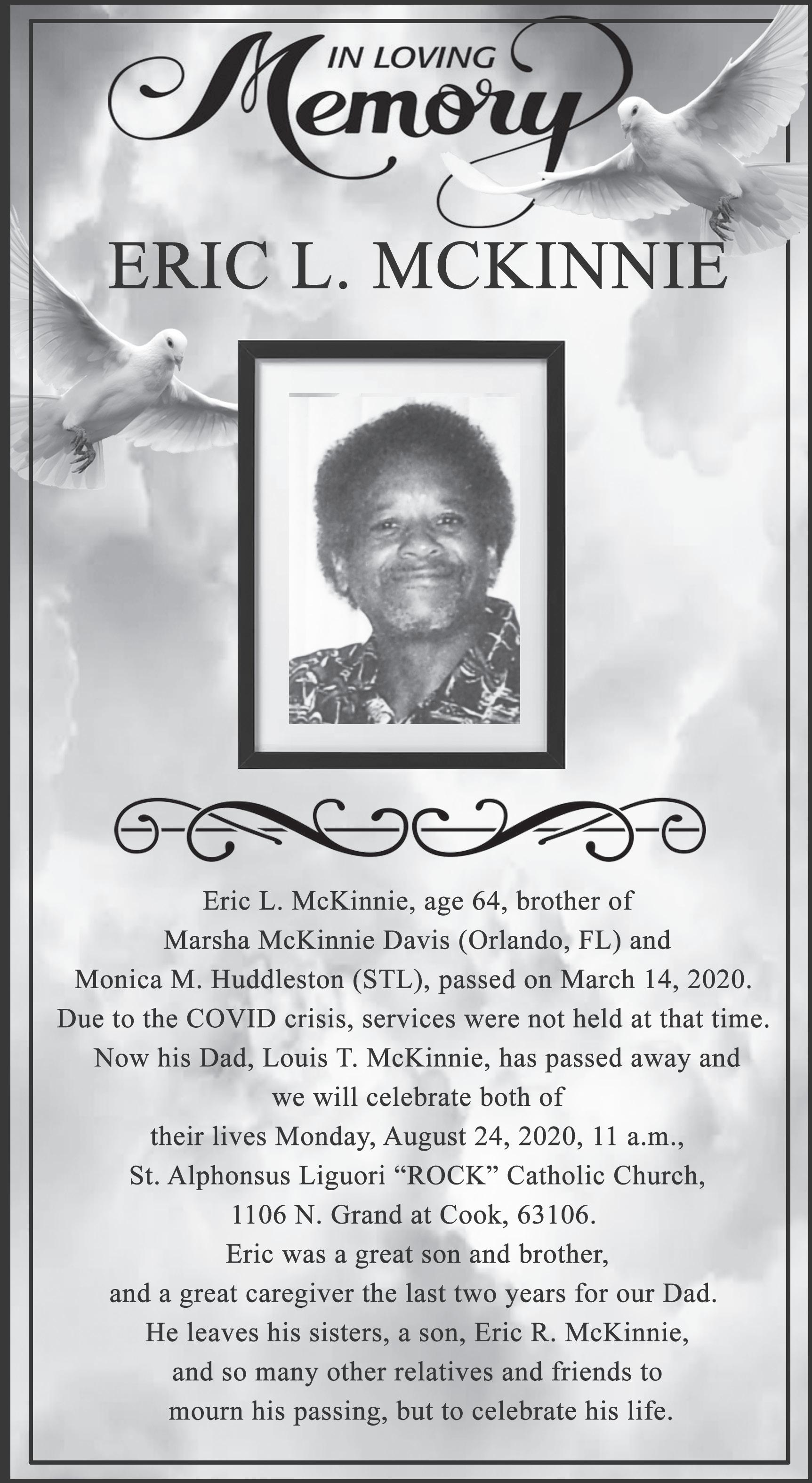
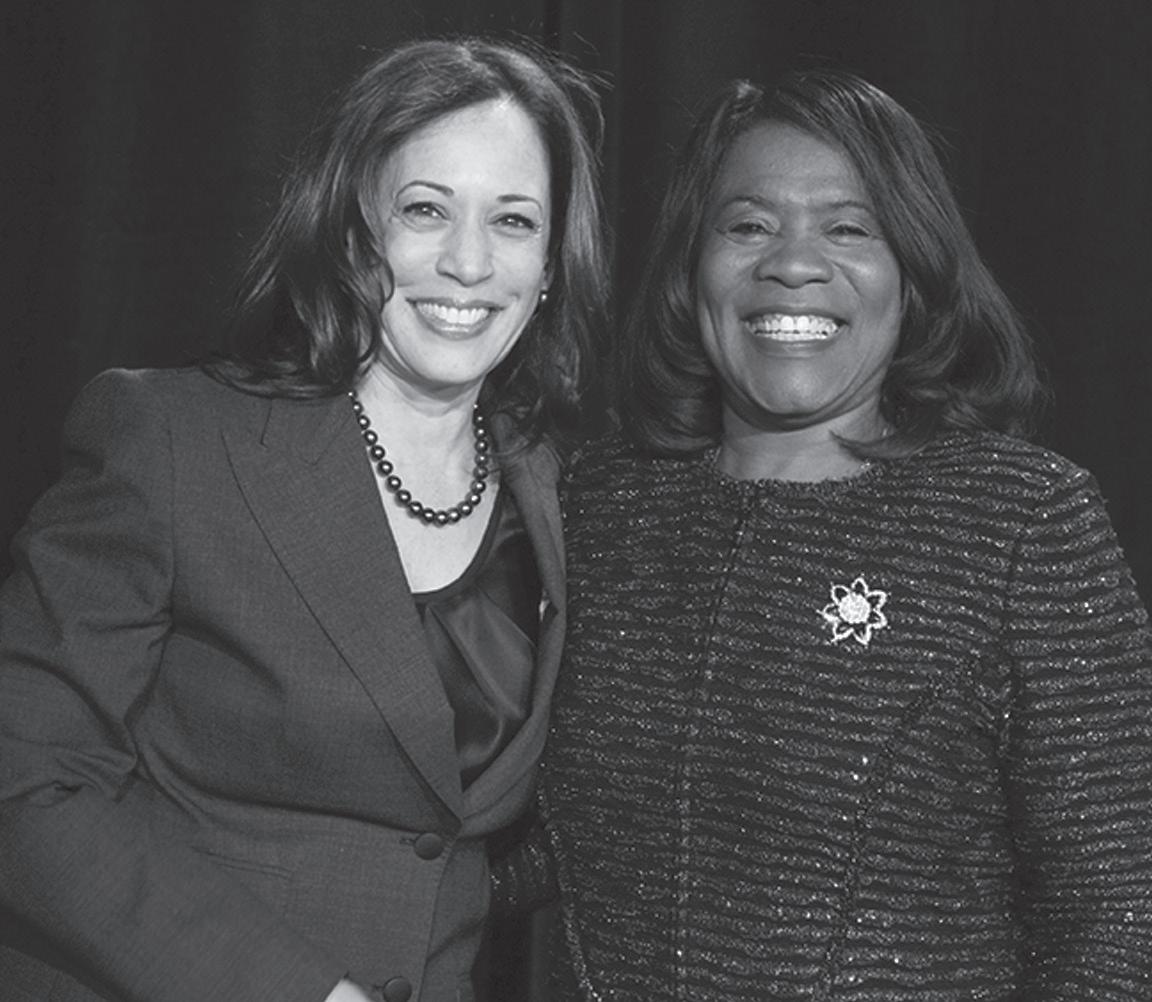
U.S. Senator Kamala Harris and Dr. Glenda Glover is international president of Alpha Kappa Alpha Sorority, Inc. and president of Tennessee State University.
‘She is intelligent, experienced, charismatic and above all qualified’
By Dr. Glenda Glover For The St. Louis American
On behalf of over 300,000 members of Alpha Kappa Alpha Sorority, Inc., I congratulate U.S. Senator Kamala Harris on being selected as running mate for Joe Biden. This is a great day for our country, a great day African Americans and for women.
Senator Harris’ selection is a full-circle moment for HBCUs and African-American Greek organizations that worked tirelessly to give the Black com-
munity a voice from the turn of the century, through Jim Crow and the Civil Rights Movement, to the present day.
As the president of Tennessee State University, a premiere HBCU, and as international president of AKA, of which Senator Harris is a member, I am doubly proud of this selection. I also commend Joe Biden for his insight to bring someone of Senator Harris’ stature to the ticket. She is intelligent, experienced, charismatic and above all qualified for the job.
African-American women have been the backbone of this country, and now an AfricanAmerican woman has the opportunity to ascend to the second-highest office in the nation, with the opportunity to create policies that will impact us for generations to come. While AKA does not endorse any particular candidate or party, we are extremely proud of Senator Harris.
Dr. Glenda Glover is interna tional president of Alpha Kappa Alpha Sorority, Inc.




*
A home of one’s own means so much to so many. At the end of work, it’s where you kick off your shoes and get comfortable. It’s where your children will flourish and your garden will grow. It’s where your kitchen and dining room overflow with love and laughter as your family gathers for holidays and special occasio ns. Until now, needing a significant down payment has made the reality of owning a h ome almost impossible. Midwest BankCentre is proud to offer a 100% mortgage financing * option that gives buyers the ability to purchase a home with zero down payment .


In addition to 100% financing, we offer many other financing options including FHA loans, conventional loans, VA loans, construction loans, refinancing and many more. Contact us to find the option for you and your family.
as a number between 300 to 850 and in theory, the higher the number the more credit worthy the borrower. Generally credit scores from 580 to 669 are considered fair; 670 to 739 are considered good; 740 to 799 are considered very good; and 800 and up are considered excellent. If you haven’t established a credit history or your credit is low, we have good news for you—it doesn’t have to stay that way!
A person’s credit score is a tool used by lenders to determine the likelihood that the loan can be repaid. It is generally reported
WHAT’S A CREDIT SCORE AND WHY DOES IT MATTER?
is the total of interest and principal) should not exceed $840.
$3,000 per month, than your monthly mortgage payment (which
The general rule of thumb is that your mortgage payment should not exceed more than 28 percent of your monthly take home pay. Using that formula, if your take home pay equals,
In addition to your mortgage, consider all your other monthly expenses. What “must haves” like utility bills, property taxes, homeowners insurance, food and medications are part of your monthly budget. There are “should haves” like an emergency fund for unexpected expenses. And don’t forget the “nice to haves” like cable TV access, occasional meals out, or maybe after school programs for your children.
CAN AFFORD IT?
Building your credit takes time, but Midwest BankCentre has tools to help. As part of our Life Happens™ suite, we have products that will help you build or improve your credit history while you handle emergencies and build your savings. Life Happens™ includes:
• You know your credit score, and it is above 620.
• You have an emergency fund.
• You pay your bills on time and are not overextended.
• Your income is unsteady.
• You have regular sources of income. NOT
• You don’t have a credit history or know your credit score—and when you find out, it’s below 620.
• You don’t have emergency savings.
• Your debts are more than 43 percent of you income.
READY!
READY
While monthly income is a major consideration, also look at your finances from several angles. Below are signs you are ready—or not ready—to buy a home.
Ready or not?
• Pay Day Alternative Loans to help you get quick access to emergency funds without using high-cost “pay-day loan” vendors. • Personal Unsecured Emergency Loans to help you get quick access to emergency funds for longer-term needs.
• Credit Booster CD Loans to start a savings account while establishing your credit history or repairing your credit.
• New Beginnings Checking to open a checking account even if you have no financial history or a low credit score.
Homeownership has many advantages. Is it right for you? Here are some questions to ask yourself.

By Jamala Rogers For The St. Louis American

When St. Louis County Prosecutor Wesley Bell recently announced that there would be no indictment of former Ferguson cop Darren Wilson, it ignited a range of emotions from outrage to disappointment. For many, the historic election of Bell as the county’s first AfricanAmerican prosecutor would mean real justice for Michael Brown, his family and a still grieving community. Those of us who’ve been doing this work for a while know that it is a classic case of using the master’s tools to dismantle his house—to paraphrase a quote from our beloved sister Audre Lorde. That hasn’t worked.
I also was outraged by the Bell announcement but for completely different reasons. In 1983 I was a part of getting the first indictment of a St. Louis cop. Joseph Ferrarrio had recklessly murdered Marilyn Banks, a young, Black mother sitting on her front porch. Ferrario ‘s attorney got a change in venue. Some of us traveled to Kansas City the following spring with fierce determination that we’d bring a victory back home to our community. Instead we witnessed the acquittal of a murderer.
Yes, we got Ferrario fired. Yes, we got the largest settlement in Missouri history (at that time) for Marilyn’s surviving children. But we came up empty handed on criminal charges. Conclusion? We’ve got to work harder. For more years that I care to remember, groups like the Organization for Black Struggle (OBS) and the Coalition Against Police Crimes and Repression (CAPCR) fought really hard to make rogue cops accountable for their crimes. I traveled all over the country fighting with other
n Holding police accountable has been made more difficult because their lethal actions are deemed legal.
communities to get justice. Continually, we hit brick walls and saw killer cops walk free. Then we started to look at why. What justice-seeking people have found is a formidable blue wall of policies, laws and court rulings that make it damn near impossible to indict, prosecute or convict police officers. These tools made it super easy for police chiefs, police unions, lobbyists, defense attorneys and prosecutors to make cops untouchable.
Missouri Revised Statues Chapter 563 gives wide discretion to officers to use deadly force if he or she uses




reason. The definition of reason has been defined by SCOTUS rulings like the 1985 Tennessee v. Garner case and the 1989 Graham v. Connor case. The situation must be viewed from the eyes of the cop.
These rulings, overemphasized by attorneys when defending police, make for reluctant jurors— Black and white. Very few are willing to second -guess the ultimate justification by police: I feared for my life. Holding police accountable has been made more difficult because their lethal actions are deemed legal.
Baltimore State’s Attorney Marilyn Mosby brought criminal charges against the six officers involved in the murder of Freddie Gray. When the first three officers were acquitted, Mosby was forced to drop all charges against the other three. This is a repeat in court rooms across the country, leaving families to pursue civil rights violations if they have the resources to obtain an attorney. Even if they get a settlement, it doesn’t affect the personal finances of the cops involved. There is a new breed of prosecutors who are moving an agenda to hold police accountable. They have been stymied by the impenetrable judicial wall described earlier. They need the help of the communities who voted them in to carry out the reform agenda. We must start eliminating the barriers—the laws, the policies, the culture that protect police at all costs. We have to make killing unarmed, Black people the crime. Let’s give these public servants some new tools to do what we sent them to do.

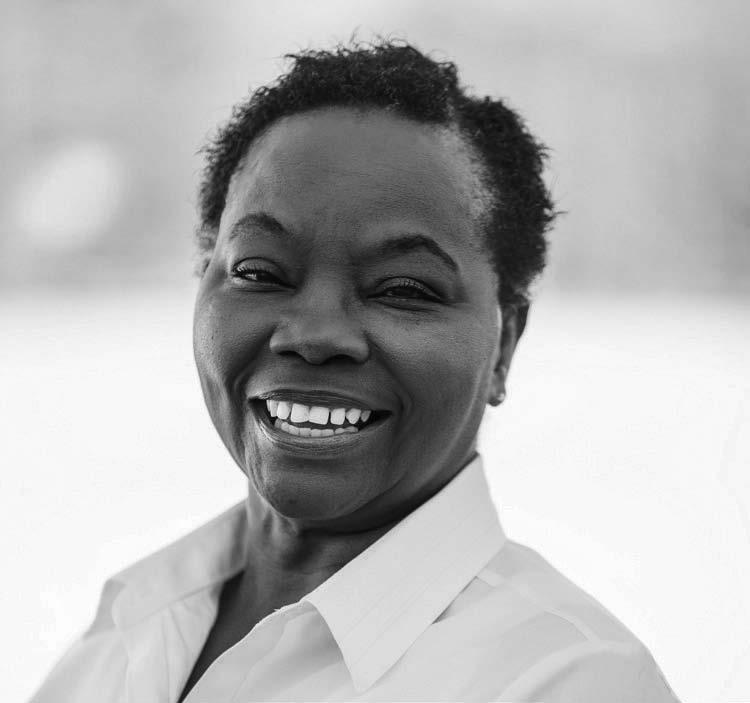


By Chris King Of The St. Louis American
One of police officers who shot and killed Kajieme Powell has been indicted by a federal grand jury of depriving someone of their constitutional rights.
Ellis Brown, who was not charged for killing Powell in 2014 while a St. Louis officer, repeatedly kicked someone identified as S.K. while that person was compliant and not posing a physical threat, according to the FBI. Brown was a St. Ann police officer when he allegedly committed this crime on April 9, 2019.
The charge, Deprivation of Rights Under Color of Law, carries a maximum penalty of 10 years in prison, a fine of $250,000, or both imprisonment and a fine.
According to the indictment, the victim, identified as S.K., suffered bodily injury as a result of the incident.
“When making an arrest, a police officer is given the authority to use only the level of force necessary,” said Special Agent in Charge Richard Quinn of the FBI St. Louis Division. “In this case, Officer Ellis Brown is accused of using unreasonable force by repeatedly kicking an individual who was compliant and not posing a physical threat to anyone.” The FBI investigated this case. Brown made his initial appearance before United States Magistrate Judge David D. Noce on Thursday, August 13. He was allowed to remain free on bond. He was ordered to surrender any and all firearms, and will not be permitted to possess a firearm for any purpose so long as the case remains pending. An indictment is merely an accusation, and the defendant is presumed innocent until and unless proven guilty.

We all have a history. A story. We bring with us life experiences that shape who we are and make us better.
At Spire, we know our individual stories only make us stronger as a whole. That’s why we’re committed to an inclusive work environment where all that makes us unique is embraced, encouraged and valued.
Because it truly takes all of us—our backgrounds, our perspectives and our experiences—to move forward.














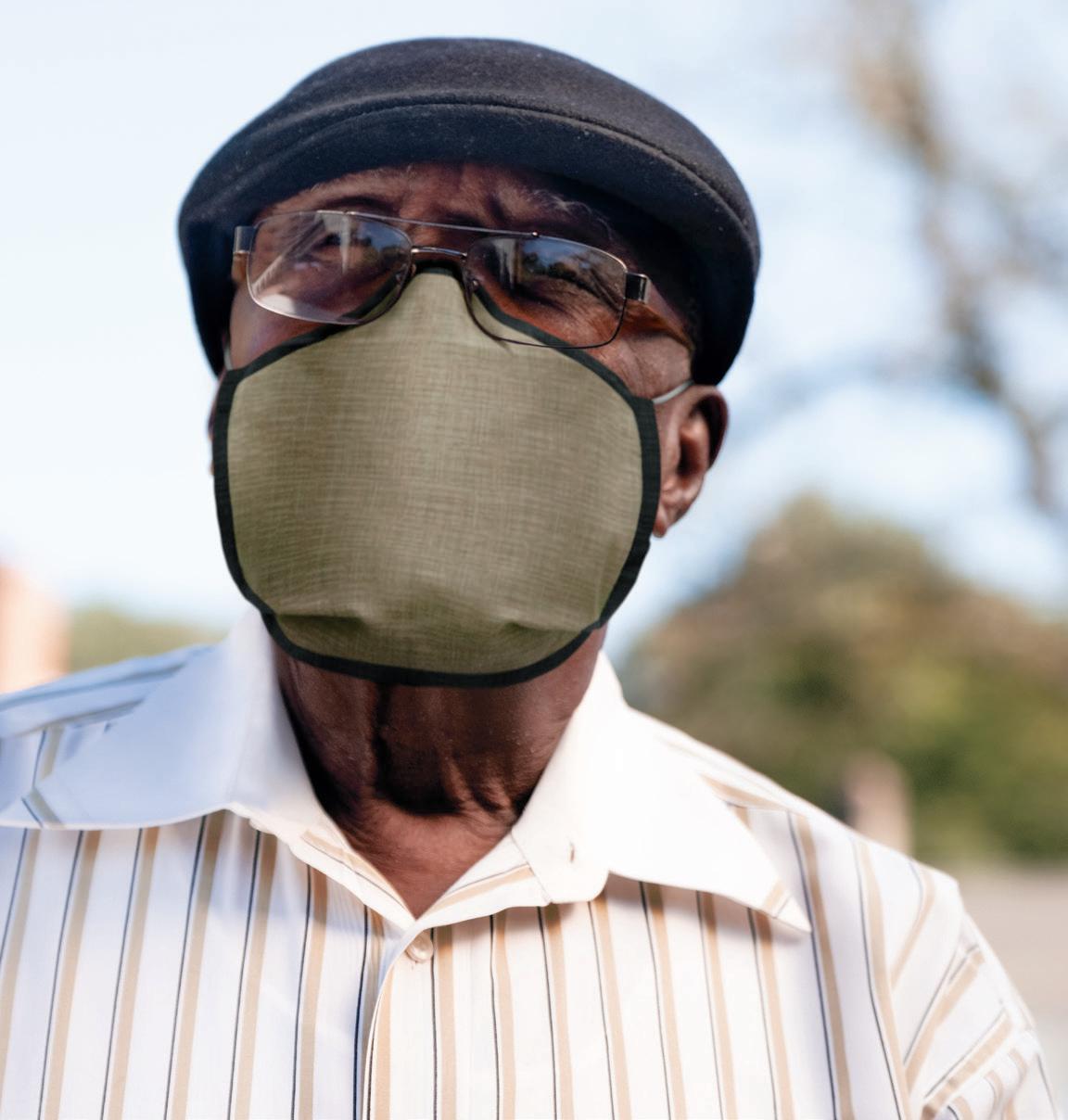





By Chris King Of The St. Louis American
The pain and anger sparked by police violence have inspired many rap songs and protest chants. Poetry composed on a page and published in a book might seem a less promising format to approach this troubling subject, but St. Louis native Jabari Asim shows it can be done and done well in Stop and Frisk: American Poems, his new collection of 35 poems published by Bloomsday Literary.
This book is haunted by the victims of police violence whose names become better known every day. Former U.S. poet laureate Robert Pinsky calls these poems “documentary,” and they are that. Some poems are literally documentary, pieced together from comments posted on police discussion boards. Many refer to some notorious video document of police violence that went viral. One poem is composed of nothing but the names of such victims. The poetry is very contemporary and is published at just the right time. Michael Brown gets his own poem. The Ferguson unrest gets another, told from the point of view of a CNN reporter on the street. But Asim has a longer memory than your average Twitter thread.

Abner Louima, sexually abused by New York police in the almost distant past of 1997, is remembered in one poem. The routine vigilante rape of Black women during American slavery is remembered with quiet horror in another.

Quiet horror, in fact, describes the tone of the entire collection. The poet does not dramatize and certainly does not glamorize violence. Police violence is simply accepted as a fact of Black life and, as such, an appropriate topic for Black poetry. The commonplace character of such violence adds to the horror as one turns the pages

In “Eros Bendato (Eros Bound)” by Igor Mitoraj in Citygarden, the Greek god of love is already wearing a sort of mask of bandages, though it would not meet CDC approval for controlling the spread of COVID-19. St. Louis Arts Chamber of Commerce using public art to promote public health


By Chris King Of The St. Louis
American
of this slim book and is disturbed by how familiar all this pain and death have become. Asim writes very simply. These poems can be understood by anyone who can read the English language and could be taught at almost any level by the properly daring teacher. He cites
St. Louis native Brittany Packnett Cunningham adorns the cover of the September 2020 issue of British Vogue. In an unusual photojournalism power couple move, the photograph was taken by her husband, Reginald Cunningham, who is also a St. Louis native. They first met at a Black Lives Matter protest following the 2014 St. Louis Police killing of Vonderitt Myers Jr. just a few blocks from Cunningham’s family home. They were married in New Orleans at the end of 2019.
“We’ve spent more time as a married couple in quarantine than out,” Cunningham told British Vogue via Zoom from St. Louis. “It has been a wonderful test for us as newlyweds. I’m happy to
Lola Ogbara is in three-artist show at UMSL’s Gallery 210
American staff
Lola Ogbara is one of three St. Louisbased artists featured in “Exposure 21: Three Myths,” an exhibition opening August 29 at UMSL’s Gallery 210. According to Gallery 210 Director Terry Suhre, Ogbara’s artwork looks to the intersections of Blackness, queerness and womanhood as a way to process the circumstances of these identities throughout time.
“My practice explores the multifaceted implications and ramifications of sexuality in regards to the Black experience,” Ogbara said in an artist statement. “I work with clay as a material in order to emphasize a necessary fragility which
symbolize an essential contradiction implicit in empowerments.”
Ogbara was born and raised in Chicago and earned an MFA in Visual Arts from Washington University Sam Fox School of Art & Design.

“Imagining experiences without deviant myths that perpetually place Black feminine sexuality in anguish tied to horrid racist histories, I often use and reference my own body to create possibilities of pleasure,” Ogbara stated. “Through material usage and composition, I emphasize the nexus between Western colonization and contemporary Black social cultures in order to further progressions of a future that isn’t reliant on history.” Because of the COVID-19 pandemic, this and all other UMSL gallery exhibitions will be presented online during the 2020-21 academic year. The gallery will be open to the public by appointment only and will limit groups to no more than 10. Masks
“Blind City” is a podcast hosted by Langford Cunningham focused on helping people to overcome depression, suicide, substance abuse, violence and, now, COVID-19. It takes its name from the fact that he lost sight in both eyes less than a year ago. “I had to lose my sight to find my vision,” Cunningham said. When he lost his sight, he said, he became bitter and angry with the world, including God. He wanted to commit suicide, but, he said, God stepped in and gave him purpose. Previously, in 2008, he made a documentary, the “Hood Chronicles,” that explores crimes, sexually transmitted diseases, and debilitating issues affecting the community. He also received a bachelor’s degree in criminal justice, worked as a counselor at a state prison and as a deputy juvenile officer, coordinating projects for juvenile detention and formulating lesson plans for juvenile delinquents.
and more than 10 partner organizations will install custom-made masks on over 35 statues and sculptures throughout St. Louis city and county. In order to encourage mask wearing as a way to help combat the coronavirus pandemic, many pieces of public art around our region will soon sport a St. Louis-themed mask.
“We hope these sculptures that residents and visitors of the region routinely visit or pass by in their daily commutes will serve as an example and reminder that we all need to

Cunningham
asked, “had to lose sight of reality to find the vision of truth?”
He now wants to use his newfound vision to help others see and to vope.
A St. Louis native, he said he “lived a life of corruption, drugs, and gang violence” before he found the light by losing his sight.
“How many of us,” he
work together to help combat the coronavirus by doing simple things – like wearing a mask,” said Sandy Brooks, executive director of the Arts Chamber. Local artists and volunteers will fabricate custom masks individually designed to fit each statue and sculpture approved for this project. Masks will be installed in late August and remain on display through Halloween. Participating locations and partners include Citygarden and other city-wide public art pieces maintained by the Gateway Foundation; Carl Milles’s “Meeting of the Waters” and Henry Kiener’s “Olympic Runner” through

Continued from B1
are required.
The other artists in “Exposure 21: Three Myths,” which will remain on display through December 5, are Julian Curran, and Emma Vidal. All three will participate in an online panel discussion moderated by Jessica Baran, director of Curatorial and Program Development at Barrett Barrera Projects, at 4 p.m. on Saturday, August 29. For more information, visit https://gallery210.umsl.edu/ or contact Gallery 210 at 314-5165976 or by email at gallery@ umsl.edu.

“Blind City the podcast is giving people an opportunity to talk about their obstacles, to talk about their pain,” Cunningham told KSDK. “We are the therapy of the streets.”
For more information, visit www. BLINDCITYTHEPODCAST. com.
the City of St. Louis; sculptures throughout the campus of Washington University and St. Louis Children’s Hospital, facilitated by the faculty and students of the Sam Fox School of Design and Visual Arts; the Stan Musial statue and other figures throughout Busch Stadium and Ballpark Village; the “Jelly Baby” display at St. Louis Public Library Central; and pieces installed throughout the Delmar Loop. The full list of locations can be found at www.stlouisartschamberofcommerce.org/ maskupstl. Contact the Arts Chamber at MaskUpSTL@ stlouisartschamberofcommerce. org.
Continued from B1
Black poets – Countee Cullen, Gwendolyn Brooks, Langston Hughes – who wrote simply. But this work is far from simplistic.
Though Asim is not showy, he quietly attempts formal experiments throughout the collection. One poem is written as a glossary of terms derived from police violence. He adopts dramatic form in sever-
Continued from B1
say that we’re passing with flying colors.”
Though Cunningham’s mother was a photographer, he began to develop the art during the Ferguson unrest. He later

al poems. He redacts lines in one poem like a police report being made public. His poem for Michael Brown mashes up the words “man,” “heat” and “cop,” making a mess on the page suggestive of the act of violence at the center of the poem.
As the title suggests, police abuse is the dominant subject of this collection, but the poet glances at other acts of violence and other facets of Black life. We encounter the “collateral” deaths of Black youth who kill each other. The loose cigarettes (“loosies”) made notorious by the police killing of Eric Garner are appreciated for their own power to shorten lives. This is not a book anyone is likely to read to feel good, but the beauty of Black music and dance flits through the poems, like the warm memories of the good moments in days that end horribly. The last line of the book is “Deep thrum of bass,” suggesting that life and its comforting rhythms go on despite all of the pain and loss. But the line before it – “Wreck and ruin” – is what you need to brace yourself for before you go reading Stop and Frisk
moved to Washington, D.C. to work as a photographer fulltime with the encouragement of Packnett Cunningham, his then girlfriend. Eventually, he founded his own brand, Be Pure Black.
“We’re in the middle of a cultural revolution right now, where a lot of exposure is coming to Black creatives, and we’ve always tried to amplify those voices,” Cunningham told British Vogue. “Being able to do that in a shoot for a Black editor-in-chief is simply amazing.”
Edward Enninful is editorin-chief at British Vogue.
Packnett Cunningham selected a gown by Congolese designer Anifa Mvuemba for the final cover image, which Cunningham shot in D.C.’s Rock Creek Park.
“In the days leading up to the magazine being released, we were already excited,” Cunningham told British Vogue. “We’d look at each randomly and be like, ‘Hey babe, you’re gonna be in British Vogue.’ Then we found out that we were going to be
on the cover, and we were just ecstatic, thanking God all morning. It felt completely surreal.”
As their hometown newspaper, The St. Louis American has covered especially Packnett Cunningham since long before she was known outside of St. Louis or the United States. In an interview with The American as then executive director of Teach For AmericaSt. Louis published in June 25, 2014 – just a month and a half before the police killing of Michael Brown would provide an unprecedented platform for her and many other Black people from St. Louis to lead – she made prescient remarks.
“St. Louis has a special mix of people who are not out for self-glorification but for the betterment of the community,” she told The American. “That network cuts across multiple backgrounds, sectors and fields. They are people ready to take ownership of St. Louis.” And, it turns out, to take leadership of America and maybe even the world.




The Missouri History Museum’s newest exhibition, “Beyond the Ballot: St. Louis and Suffrage,” honors the role of women as changemakers, and the Missouri Historical Society has two upcoming virtual programs that address this transitional moment. You can join both programs virtually via Zoom by visiting the events calendar at mohistory.org.
‘Beyond’ the Ballot is open now through March 1, 2022 with free timed tickets
By Emily Underwood and Shakia Gullette Of Missouri Historical Society
One hundred years after the 19th Amendment granted women the right to vote, we have an opportunity to not only look back at the stories of the suffrage movement, but to contextualize that history, re-examine it, and connect it to the lives of women today.
Despite the ratification of that landmark amendment on August 18, 1920, the chronicle of voting rights for all women, as well as women’s participation in the political process, was far from over. Today we continue to reckon with a fraught and fractured past while seeking equity within the ongoing fight for women’s rights, shaping our future, and celebrating the groundswell of support for women candidates entering the political arena.
As a community, there are moments in which there is a palpable sense that we are dwelling at the juncture of past and present. This confluence of frustration and optimism, of what has been and what could be, has manifested locally in many ways, but perhaps most visibly in the St. Louis Women’s Marches (which are not affiliated with the National Women’s March) and the recent primary elections. The energy around women and their role in making change is hard to ignore.
The Missouri History Museum’s newest exhibition, “Beyond the Ballot: St. Louis and Suffrage,” honors the role of women as changemakers, and the Missouri Historical Society has two upcoming virtual programs that address this transitional moment and the most recent surge of women stepping up to make their voices heard, both on the streets and on the ballots.
racial divisions of women’s movements, but the bulk of the evening will focus on bringing it all up to date with three outstanding panelists. Amy Hunter is a longtime community activist, writer for Essence and other magazines and journals, and TEDx speaker. Nadida Amatullah-Matin is the founder and executive director of the AbdulWakil M. Kamal Memorial Foundation, which offers support to individuals returning home from prison, as well as Matin House, a home for survivors of human trafficking. Both Hunter and Amatullah-Matin have served on the planning committee for the St. Louis Women’s March. Mary Ferguson is the racial justice director for the YWCA of Metro St. Louis and runs its Witnessing Whiteness program. She has also provided training to the Ferguson Commission through her business, Midwest Consulting Partners.
These women will tackle the challenging questions of how women work together across racial and cultural divides, how to prioritize issues and goals, and what our next steps are as a community.
The second program you’ll want to tune in for is “Represent,” on Wednesday, August 26, also at 6:30 p.m. Local author Amanda Doyle will lead a moderated conversation with June Diane Raphael and Kate Black, authors of “Represent: The Woman’s Guide to Running for Office and Changing the World.”
n Ella Jones, the first Black woman to be elected mayor of Ferguson, will share her experience as a woman who successfully ran for office and how the advice in “Represent” resonates with her.
Raphael is an actress, comedian, screenwriter, producer, podcaster, and activist best known for her starring role in the Netflix series “Grace and Frankie.” Kate Black is a policy advisor in the federal government and was formerly chief of staff and vice president of research at EMILY’s List, the largest resource for women in politics. She also served as executive director of American Women, a nonpartisan research organization working to uplift the voices of women and the issues they care about.
They will be joined by Ella Jones, the first Black woman to be elected mayor of Ferguson. Jones will share her lived experience as a woman who successfully ran for office and how the advice in “Represent” resonates with her personal journey to mayorship.
By Nimrod Chapel Jr.
For The St. Louis American
Recently, Governor Mike Parson announced that his continuing efforts to involve federal law enforcement in state matters through Operation LeGend will expand to St. Louis. Operation LeGend is supposed to be a federal anticrime program. According to the United States attorney, it launched in July in several cities, ostensibly to assist city police in high-crime areas with a particular focus on gangs.
Some kinds of violence between citizens in urban areas are decried as “absolutely intolerable” by the state Attorney General Eric Schmitt. Missouri has open cases such as Tory Sanders, who was murdered in a Mississippi County Jail cell by 11 law enforcement officers, and there’s no prosecution.
In Kansas City and St. Louis, there are police shootings of African Americans that won’t ever be touched by Operation LeGend.
In a country where the rule of law is equivalent to justice when applied equally, the Missouri NAACP Travel Advisory issued in 2017 rings
as true now as when it first went into effect.
Murders in the state, wherever they occur by law-enforcement, are not getting prosecuted except with rare exceptions.

Tory Sanders died just as George Floyd did with a knee on his neck. Still, the same federal agents in the U.S. attorney’s office and the Missouri attorney general‘s office have refused to prosecute the killers with badges. Interesting that now they can devote endless resources to the prosecution of presumed killers of color in urban areas.
As St. Louis County NAACP
President John Bowman said, “This is a political stunt. Missouri’s history of racial inequity goes back to before it was a state. A system of unequal justice applied to people of color in the face of clear violations of Constitutionally protected rights to life, liberty, and property. This is one of the issues the NAACP in St. Louis
County and Missouri seeks to resolve.”
Time is up. The failure of Missouri Attorney General Eric Schmitt to prosecute the murder of Tory Sanders shows the callousness and indifference in which the law is applied when a victim is a person of color versus the accused killer being a person of color. Missouri death penalty cases show this is also true; whether an individual
Up first is “What Are We Fighting For: From Suffrage to the Women’s March” on Thursday, August 20, at 6:30 p.m. This panel program will draw connections between the struggles of women 100 years ago and the issues that are at the forefront for women today, including the successes, challenges, and controversies that have emerged in recent years.
It will begin with a brief look back at the
You can join both programs virtually via Zoom by visiting the events calendar at mohistory.org. Just select the event, then look for the “Join Through Zoom” button at the bottom of the program description. “What Are We Fighting For” will also be available to view on MHS’s YouTube channel beginning next week.
“Beyond the Ballot” is open now through March 1, 2022, at the Missouri History Museum. The museum is currently open to the public on Wednesdays through Sundays with free timed tickets.










Lawrence T. Wooten honored for 20 years of service in COGIC
By Ramona Curtis
Of The St. Louis American
Bishop Lawrence T. Wooten, pastor of Williams Temple Church of God in Christ, was honored on June 27 for 20 years of service as the Eastern Missouri Western Illinois Jurisdictional Bishop of the Church of God in Christ (COGIC).
Dozens of cars adorned with signs and balloons paraded in front of the North City church as Bishop Wooten and his wife, First Lady Shirley Wooten, waved to supporters honking their horns.
“I was totally surprised today, amen,” Wooten said later. “When all of you showed up, it was totally by surprise. God has been good to me.”
Bishop Wooten was elected to the board of the Church of God in Christ in 2000 and as a jurisdictional prelate oversees more than 40 ministries in the region. Elected COGIC General Board secretary in 2012, he is the fourth-highest ranking member of the predominately African-American religious organization. Founded in 1897, the Church of God in Christ has 6.5 million members in 12,000
churches across more than 100 countries.
“It has been 20 years that our leader has served this jurisdiction,” said Bishop Nelson Watts. “And now he is the secretary on the General Board. I think that is a great achievement.”
Wooten has been the pastor of Williams Temple since 1979. The father of 6, grandfather of 10 and great-grandfather of 7 holds a doctorate degree and is a retired public school administrator.
“He’s been the pastor since I was 12, and we’ve always been in the church,” said his daughter Kimberly Wooten. “He’s always giving to people. He’s 79 now, and we have to look out for him.”
Several of the 12-member COGIC General Board have been impacted by COVID-19, and Wooten’s wife recently returned from caring for her mother who was diagnosed with the virus but has since recovered.
The Saturday morning gathering in the parking lot of Williams Temple practiced social distancing, with people sitting six feet apart from each other and wearing masks. The

celebration included singing, dancing, and gloved hands raised in worship. The St. Louis Fire Department recognized
n The Saturday morning gathering in the parking lot of Williams Temple practiced social distancing, with people sitting six feet apart from each other and wearing masks.
Wooten by draping a huge American flag in front of the church. Wooten was honored with a

of Alderman President Lewis Reed “You all have blessed this city so much just by your pres-
ence, not just for the things you do out in front of the public but the things you do when the public isn’t watching,” said Reed, who said he considers himself a personal friend of the Wootens.
“With all of the challenges we have, can you imagine what the City of St. Louis would be like without the Wootens here holding this church together and making sure people stand with God?”
Williams Temple is located at the intersection of Union Avenue and Dr. Martin Luther King Dive. Across the street from the large church sits Bishop LM Wooten Family
Life Center.
“After Williams Temple came to this corner, this corner became known as the Miracle Corner,” Watts said.
St. Louis Police Chief John Hayden said Wooten’s impact reaches beyond the neighborhood r. Wooten, who lives in Florissant, served as a member of the Board of Police Commissioners for St. Louis County beginning in 2014, during the time of Ferguson protests over the killing of Mike Brown.
“He got appointed at a time of a lot of chaos,” Hayden said. “But who was the person that God put in place to steer law enforcement at the time?” In abbreviated remarks due to rain, Wooten said he was thankful to God for the opportunity to serve.
“I just want to be a servant to the people,” he said.

Former St. Louis Cardinal Fernando Tatis Sr. is the only Major League player to hit two grand slams in the same inning. He accomplished the feat against the host Los Angeles Dodgers on April 23, 1999 and both came off pitcher Chan Ho Park. That makes it a record that will most likely never be broken.
His son, Fernando Tatis Jr., hit the first grand slam of his career on Monday night, propelling him past L.A. Angels outfielder Mike Trout for the lead in MLB home runs with 11. He is off to the best start through 100 games in Padres’ history, landing first in home runs (30), slugging percentage (.625) and OPS (1.010). He is second in hits (127), batting average (.320) and RBI (71).
gonna be the face of this game very, very soon.”
A native of the Dominican Republic like his father, Tatis Jr. told Passan there is only one thing wrong so far in his career.
“I get homesick,” he said.
“Missing my culture, missing being out here, missing being around my family and just missing being home. ... It’s a blessing to be Dominican.
That’s how people see it and say it out here. I love my country, especially our culture -how we dance, how we enjoy music, how we enjoy being outside, having a good time. For us, it’s different.”
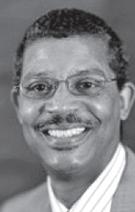
It’s an amazing start – and Tatis Jr. could be doing this for the St, Louis Cardinals.
Tatis Sr. recently told Hector Gomez of the Chicago White Sox in a Zoom interview that his son had numerous workouts with the Cardinals.
“(Tatis Jr.) was shown in 19 tryouts with the St. Louis Cardinals organization. The tools, the skills, everything was there. Many times, I asked myself why they didn’t sign him,” Tatis said.
The White Sox signed Tatis Jr. after the Cardinals passed on him. Desperate for pitching, the White Sox traded him to the Padres for James Shields. This is being called “the worst trade” in that team’s history.
MSN Sports Fansided columnist Mike Luciano wrote, “St. Louis has to be livid with the fact their inaction cost them a shot at Tatis. It’s hard to spot future MLB talent at any age, and it’s even harder to scout teenagers. However, the fact that the Cardinals barely gave Tatis the time of day will come back to haunt them if Tatis continues to evolve into a superstar.”
His teammate, Eric Hosmer, told ESPN’s Jeff Passan, “He’s 21 years old. And there’s no question, he’s the face of this franchise. And I think he’s
Tatis Jr. was born in 1999, the season his father hit 34 home runs for the Cardinals, including that pair of grand slams against the Dodgers. Tatis Sr. was raised in poverty and quit school to pursue a baseball career. Tatis Sr. refused to let his son quit school and made him learn English in preparation for his future, hopefully, as a Major League player.
Tatis Sr. then watched his former team repeatedly pass on his son’s talent. It has turned out well for both father and son.
“Only God can stop him,”
Tatis Sr. told Passan.
“He got all the skill. He got the determination in the game. Every time he’s hitting the field, he only have one [thought] in his mind: winning the game. You cannot blink your eye on him, because he’s going to challenge you. He’s going to get you.”
It’s too bad the Cardinals didn’t get him.
Jones talks, says nothing
The NFL (and political) world had been awaiting word from Dallas Cowboys owner Jerry Jones on the possibility that some of his players will kneel during the national anthem in support of Black Lives Matter and ending racism in America.
In 2017, Jones demanded his players stand for the anthem with “toe on the line.”

Anyone who protested during the anthem would be benched and/or released from the team.
He spoke last week on the subject – and really didn’t say much of anything.
‘’That was then ... this is now,’’ Jones said last Wednesday.
‘’These are very sensitive times. I have nothing to prove as far as where I’m standing with the flag and where the Cowboys stand. I have nothing to prove regarding my players and my support of our players.
‘’I want our players to understand the perception and where they’re coming from regarding the flag and the sensitivity there, and the many memories there. And I want our fans to understand ... where our players are coming from there.’’
He used the word “grace”
several times when discussing the situation, but did not say what he will do if a Cowboy dares kneel or raise a fist during the anthem. I guess we will find out on Sunday night (September 13) when the Cowboys help open SoFi Stadium in Los Angeles against the host Rams in a nationally televised game on NBC.
The Wright stuff
The fact that Kamala Harris is the first woman of color nominated for vice president of the United States is historic.
The fact that Jason Wright was named president of the NFL’s Washington Football Team, becoming the first black person to hold that position for any franchise, is pathetic.
I’m not hating on Wright.
It’s just pitiful that a league that celebrated its 100th season last year is just now getting to this point in its history. If that ain’t systemic racism, what is?
Wright is a former NFL running back who played for several teams during his career. After football, he earned his MBA at the University of Chicago and began working with the prominent consulting firm McKinsey & Company.
According to owner Daniel Snyder and the franchise, Wright will navigate operations, finance, sales and marketing.
He comes to a team that is being internally investigated for its toxic, sexist culture. The franchise has dropped the racist Redskins title and will change its name in the coming year.
Several of Snyder’s co-owners reportedly want him out as
majority owner and are threatening to sell their shares in the team.
Wright is inheriting a hot mess.
Let’s be clear. I’m not a savior. Neither is Coach Ron Rivera,” he told the Washington Post.
“There’s no silver bullet for turning around an organization. Hopefully, having not grown up in [Washington’s] front office allows me to bring some catalytic thinking. It’s the same reason organizations bring in people externally — to push the thinking, to have new, creative ways of thinking about things, maybe be a bit disruptive.”
Wright did not shy away from the word “inclusion” during his initial interviews and explained why it makes business sense.
“When you have women, minorities, different backgrounds, different disciplines, different educational backgrounds weighing in on decisions that are meaningful for the club … the data says we actually get better outcomes, you make better decisions,” he said.
At 38, Wright is now the youngest president of a franchise in the NFL and he will also be point man on the future effort to build a new stadium for the franchise.
Good luck, dude. You’re going to need some of it to get Snyder’s dumpster fire extinguished.
A very odds time
The Los Angeles Lakers are the favorite to win the NBA Finals, according to Caesar’s Casino and Sportsbook. Jayson Tatum and his Boston Celtics aren’t far behind. Los Angeles Lakers: +200 (Bet $100 to win $200); Milwaukee Bucks: +300; Los Angeles Clippers: +300; Boston Celtics: +1100; Toronto Raptors: +1100; Houston Rockets: +1200; Denver Nuggets: +2000; Portland Trail Blazers: +3000; Miami Heat: +3500; Oklahoma City Thunder: +3500’ I might take a shot on the Rockets, depending on Russell Westbrook’s health.
In my 35 years of covering high school sports in the St. Louis area, I have had the pleasure of watching some incredible athletes accomplish some tremendous feats in athletic competition.
But the one youngster who has taken his success to an extraordinary level has been former Hazelwood West track and field star Justin Robinson, who will be entering his freshman year at Arizona State University. What Robinson has been able to accomplish in his sport against the level of competition he’s faced is unheard of for a high school athlete from St. Louis. Robinson added to his incredible track legacy last weekend when he competed at the American Track Series Race in Marietta, Georgia. In

his first outdoor competition of the year, Robinson finished first in the 400-meter dash in a time of 44.91 seconds, which is currently the No. 1 time in the world. Not the top time in the world among high school athletes. It’s the No. 1 time in the world among all athletes who compete in the 400. Robinson also became the second high school athlete in history to turn in two sub-45-second races in the 400. He completed the lap in 44.84 seconds at the Great Southwest Classic in Albuquerque, N.M. in 2019 after his junior season when he led Hazelwood West to the Class 5 state championship. Later that summer, Robinson represented the USA in the Pan-American Games where he earned a bronze medal in the 400 and ran a
spectacular 43.5-second third leg to help the USA to a bronze medal in the 4x400-meter relay. That’s blazing folks. At the time, he was a 17-year old competing on the world stage against seasoned professional athletes and thriving. It has been really astounding to watch this happen.

The ultimate goal for Robinson and all of us who have marveled at his exploits is to see him compete as an Olympian. The COVID-19 pandemic has pushed the Olympic Games back to 2021. It would have been great just to see Robinson at least compete in the Olympic Trials in the 400 as a high school senior.
The 400-meter dash has always been the baby of the United States as American athletes have dominated this
event on the worldwide stage for generations. Some of the greatest athletes in the history of track and field such as Lee Evans, Butch Reynolds, Michael Johnson and so many others have starred in the 400. An athlete has to be great just to qualify for the finals of the USA Olympic Trials in the event, much less make it to the Olympics. It remains to be seen what the future holds for his promising track prodigy, but what we have already seen from Justin Robinson in terms of the times he has run and his success he has enjoyed on the big stage; it has been truly remarkable.
Napheesa Collier is WNBA Player of the Week
Former Incarnate Word
Academy girls basketball star Napheesa Collier was selected as the Player of the Week in the WNBA after a series of excellent performances. In three games for the Minnesota Lynx, Collier averaged 18.3 points, 13 rebounds and three assists a game. Collier had 26 points, 13 rebounds and five assists in a 94-64 victory over the New York Liberty. She also had 21 points and 14 rebounds in a loss to the Las Vegas Aces. For the season, Collier is averaging 14.9 points, 9.0 rebounds and 3.3 assists while shooting 49 percent from the field in heading the Lynx to a 7-3 record after 10 games. Collier is coming off an excellent debut season for the Lynx when she was voted as the WNBA’s Rookie of the Year.
A 6’1” forward, Collier was a McDonald’s AllAmerican and a three-time
state champion at Incarnate Word. She went to attend national women’s basketball powerhouse Connecticut, where she helped the Huskies win two NCAA national championships.
Sug signs with WNBA champs
Former Parkway North girls basketball star Alecia “Sug” Sutton was signed by the WNBA champion Washington Mystics over the weekend. The 5’9” Sutton was a second-round selection of the Mystics in last spring’s WNBA Draft. Sutton will join the team in the WNBA’s “Wubble” at IMG Academy in Bradenton, Florida, where all the league games are being played. After a stellar career at Parkway North, Sutton went on to have an excellent collegiate career at Texas.

ARCHS is seeking a results-oriented Director of Partnerships for the School Age Initiatives (K-12) department. Duties will include the execution and monitoring of performance-based contracts awarded to direct service providers of out of school time and youth development programs. Applicants will be expected to build and manage relationships with providers, provide monthly technical assistance and site visits, complete invoicing, reporting, and engage in performance evaluation activities. This position requires strong communication skills (written and oral), project management experience, knowledge of best practices in youth programs, ability to work in a team environment, and the ability to effectively assess, evaluate and provide feedback to providers in order to enhance programming and maintain compliance with contractual expectations. The ideal candidate will possess a Bachelor’s Degree in Social Work, Counseling, Education, Sociology, Business, or related field (Masters a plus), excellent writing and presentation skills, and strong technical skills including competence in Microsoft Office. Full benefits package, including 401(k) match. Apply online at careers@stlarchs.org or visit http://sgiz.mobi/s3/ARCHSPosition-Application?position=Dire ctor+School+Age by September 20, 2020. NO phone calls please. EOE
FT Early Childhood Education positions open – minimum CDA Certification for Infant/Toddler; AS and BA degree in Early Childhood Education for pre-school. Fax cover letter to Center Manager Linda Davis at (314) 385-5278 or call 679-5440.
Fontbonne University has an opening for a full-time Housekeeper. Applicant must have general housekeeping experience and the ability to work with little supervision. The incumbent will be assigned to a particular area of campus, and will be responsible for sweeping, mopping, dusting, trash removal and other housekeeping duties. Hours are M-F from 7:00 a.m. to 3:30 p.m. with occasional weekend rotation. High school education preferred along with recent experience. Believing that diversity contributes to academic excellence and to rich and rewarding communities, Fontbonne University is committed to recruiting and retaining a diverse faculty, staff and student body. Candidates from historically under-represented groups, whose work furthers our diversity and inclusion efforts and who bring to campus varied life experiences, perspectives and backgrounds are especially encouraged to apply. If interested, please apply online at www.Fontbonne.edu/employment. Please submit an application and three references for consideration. EOE

The Supreme Court of Missouri’s Commission on Racial and Ethnic Fairness (“CREF”) is seeking an independent contractor to serve as an Executive Director. CREF is responsible for promoting racial and ethnic fairness in the Missouri judicial and legal systems. The Executive Director will coordinate, plan, implement, and lead the successful completion of activities in accordance with the charge of CREF. The Executive Director also will exercise considerable judgment and discretion in the development of policies, programs, and materials.
Eligible persons will have considerable knowledge regarding judicial and legal practices, community involvement, and experience managing projects to successful completion. The work of the Executive Director will be guided by the charge of CREF in conjunction with its tri-chairs. The Executive Director will dedicate necessary time to serve the needs of CREF. Successful performance will be evaluated through personal consultations, observation, and results obtained. Interested parties shall submit a proposal including a statement of work and documentation relating to applicable education, experience and skills to email: crefdirector@courts.mo.gov
Proposals received by August 31, 2020 will receive preference but proposals may be considered until contract is awarded. Additional information on this opportunity may be found at: https://www.courts.mo.gov/ page.jsp?id=120233
The Supreme Court of Missouri is an Equal Opportunity Employer, which extends to the selection and treatment of independent contractors and any other persons or organizations doing business with the Court.
Experienced Building Maintenance Technician needed to support residential housing facility. Please reply to info@hopehousestl.com with cover letter and resume.
Contact Information: mary@alphaterraceapartments.com

The Saint Louis Zoo seeks bids from qualified contractors to bid on Pest Control RFP 2020. Bid documents are available as of 8/20/2020 on the Saint Louis Zoo website: stlzoo.org/vendor
Notice to contractors, Special School District is accepting bids for SSD Learning Center Elevator Upgrades Project For details, please visit the website at www.ssdmo.org/rfps.html SPECIAL SCHOOL DISTRICT OF ST. LOUIS COUNTY
Notice to contractors, Special School District is accepting bids for North and South Tech Salt Storage Project For details, please visit the website at www.ssdmo.org/rfps.html
Notice to contractors, Special School District is accepting bids for Southview Monument Sign Project For details, please visit the website at www.ssdmo.org/rfps.html SPECIAL SCHOOL DISTRICT OF ST. LOUIS
Responses for St. Louis Community College on B0003989 for Specifications for Worker’s Compensation Claims Administration and Loss Control Services will be received until 3:00 P.M. (local time) on Monday, August 31, 2020 at the Dept. of Purchasing, 3221 McKelvey Road; Bridgeton, MO 63044, and immediately thereafter opened and read. Bid documents can be accessed on our website at www.stlcc.edu/purchasing or by calling (314) 539-5227. EOE/AA Employer.
Great Rivers Greenway is soliciting bids for St. Vincent Greenway: St. Vincent Park to Rock Road Transit Center Go to greatriversgreenway. org/jobs-bids/ and submit by September 29, 2020. Notice To M/W/DBE Certified Businesses Advertisement River City Construction, L.L.C., 6640 American Setter Drive, Ashland, Missouri 65010, (573) 657-7380 (Phone) (573) 657-7381 (Fax) Is Seeking M/W/DBE Certified Businesses for the OR Isolated Power and HVAC Updates Project in Columbia, Missouri, (Project Number C201551) for contracting
CITY OF ST. LOUIS BOARD OF PUBLIC SERVICE
REQUEST FOR QUALIFICATIONS for PROFESSIONAL ENGINEERING AND TRANSPORTATION PLANNING SERVICES FOR NORTHSIDE-SOUTHSIDE CORRIDOR TECHNOLOGICAL ALTERNATIVES ANALYSIS, ST. LOUIS, MISSOURI. Statements of Qualifications due by 5:00 PM CT, September 24, 2020 at Board of Public Service, 1200 Market, Room 301 City Hall, St. Louis, MO 63103. RFQ may be obtained from BPS website www.stl-bps.org, under On Line Plan Room-Plan Room, or call Board of Public Service at 314-622-3535. 25% MBE and 5% WBE participation goals. PEST CONTROL RFP 2020
MUST BE SUBMITTED WITH BID. BID DOCUMENTS MAY BE OBTAINED BY:
1) Email your company name, contact name and phone number, as well as the project you are interested in to bid@rccllc.com
2) You will then receive an email invitation for that project with a link to our SmartBidNet system.
You are invited to submit a bid proposal for design/ build HVAC, Plumbing, Electrical, and Fire Protection for the Washington University School of Medicine New Research Building Parking Garage located at 310 S. Newstead Avenue. Remaining bid packages will be issued for bid in December, 2020.
Subbids are due at 1 p.m. on August 20, 2020. These may be submitted through WUSM’s Scout Bid Solicit System. Instruction for bid submission will be issued via addendum. Any questions, please contact Kevin Oakley at KROakley@tarltoncorp.com or 314.633.3351 or Brooke Pruitt at BRPruett@tarltoncorp.com or 314.633.3488.
This is the entry-level Police Officer position with the City of St. Louis Department of Public Safety Police Division. Incumbents patrol to protect life and property and enforce laws and ordinances with tactful and courteous treatment of the public. Police Officer (Trainees) receive $1,539 bi-weekly. Upon completion of the training period at the Police Academy, Police Officer (Trainees) become Police Probationary Officers and are placed in an eleven month working test period with a salary of $47,815. Upon completion of the working test period, Police Probationary Officers become Police Officers with a salary of $49,140. City residency requirement may be waived for this position. To apply, visit the City web site at www.stlouis-mo.gov or call the City of St. Louis Department of Personnel at 622-4308. SPECIAL SCHOOL DISTRICT OF ST. LOUIS COUNTY ACCEPTING SEALED BIDS SSD 128-20
It is our desire to provide meaningful opportunities for minority-owned (MBE) and women-owned (WBE) businesses to participate in the construction projects we complete for our clients. Firms that do not have MBE/WBE status are strongly encouraged to include MBE/WBE firms in their contracting and purchasing plans.
To view this invitation: https://app.buildingconnected.com/projects/ 5f172a7a532a64004e08b195/info
Tarlton is an equal opportunity employer.

ST. LOUIS COMMUNITY COLLEGE
> Doing Business With Us > View Non-Capital Bids (commodities and services) or >Visit Planroom (capital construction bids) Metropolitan St. Louis Sewer District is an Equal Opportunity Employer.
The City of Crestwood is seeking bids for the Whitecliff Park Quarry Enhancement project. This project is being assisted by the use of federal funds administered by the Missouri Department of Natural Resources (MODNR). This is an equal opportunity bidding event and MBE/WBE firms are encouraged to respond. All applicable MODNR and federal regulations shall be in full force and effect. Please call (314)729-4861 or (314)729-4722 for more information. Qualified contractors may obtain a project manual at www. cityofcrestwood.org. The bids are due by August 27, 2020 at 3:00 pm. The bids will to be received by the Office of the City Clerk of the City of Crestwood at the Crestwood Government Center One Detjen Drive, Crestwood, MO 63126. Bids may also be emailed to Jim Gillam at jgillam@cityofcrestwood.org. www.cityofcrestwood.org.
Responses for St. Louis Community College on IFB-B0003990 for a Document Shredding Contract will be received until 3:00 P.M. (local time) on Monday, August 24, 2020 at the Dept. of Purchasing, 3221 McKelvey Road; Bridgeton, MO 63044, and immediately thereafter opened and read. Bid documents can be accessed on our website at www.stlcc.edu/purchasing.
ST. LOUIS COMMUNITY COLLEGE
Responses for St. Louis Community College on RFP-B0003982 for a Human Capital Management Platform will be received until 3:00 P.M. (local time) on Tuesday, September 15, 2020 at the Dept. of Purchasing, 3221 McKelvey Road; Bridgeton, MO 63044, and immediately thereafter opened and read. Bid documents can be accessed on our website at www.stlcc.edu/purchasing.

PRIVACY-GRADE™ SOLUTION FOR DATA SECURITY
Harris-Stowe State University (HSSU) anticipates awarding a single feasible source contract in the amount of $70,000.00 to Spirion for a Privacy-Grade™ solution for data security on or about August 27, 2020. Spirion is the sole provider of the only product currently on the market that meets the definition of Privacy Grade™.
The contact for the University is Barbara A. Morrow, Director of Business Services, telephone #: (314) 340-5763, fax #: (314) 340-3322, email address: morrowb@hssu.edu
PUBLISHER’S NOTICE:
WANTED: CERTIFIED DBE, WBE, AND SDVE SUBCONTRACTORS AND SUPPLIERS FOR BOONE COUNTY, MISSOURI TOWER PROJECT.
Electronics Research, Inc. is a supplier of tower and transmission equipment for radio and television stations. ERI is looking to expand and diversify its qualified subcontractors and suppliers to support a potential new project in Boone County, Missouri. Specifically, we are searching for certified Disadvantaged Business Enterprises (DBE), Woman-owned Business Enterprises (WBE), and Service Disabled Veteran Enterprises (SDVE) that can provide material and services which include but are not limited to: Trucking and transportation service for the delivery of steel Concrete suppliers and contractors for foundation and guy anchor installation Dumpster rental; and waste removal services Salvage contractors for disposal of scrap steel and copper Portable toilet rental and disposal services Crane rental, with an operator Forklift and Lull rental Fuel delivery during construction. If you are a certified DBE, WBE, or SDVE business that can supply the services or equipment listed, would you please contact Bill Harland, Electronics Research, Inc. at bharland@eriinc.com.
Advertised herein is subject to the Federal Fair Housing Act, which makes it illegal to advertise any preference, imitation, or discrimination because of race, color, religion, sex, handicap, familial\status, or national origin, or intention to make any such preference, limitation, or discrimination.“We will not knowingly accept any advertising for real estate which is in violation of the law. All persons are hereby informed that all dwellings advertised are available on an equal opportunity basis.” Call Angelita Houston at 314-289-5430 or email ahouston@stlamerican.com to place your Bids, Public Notices, Job Opportunities, Services or Rental/Real estate ad today!







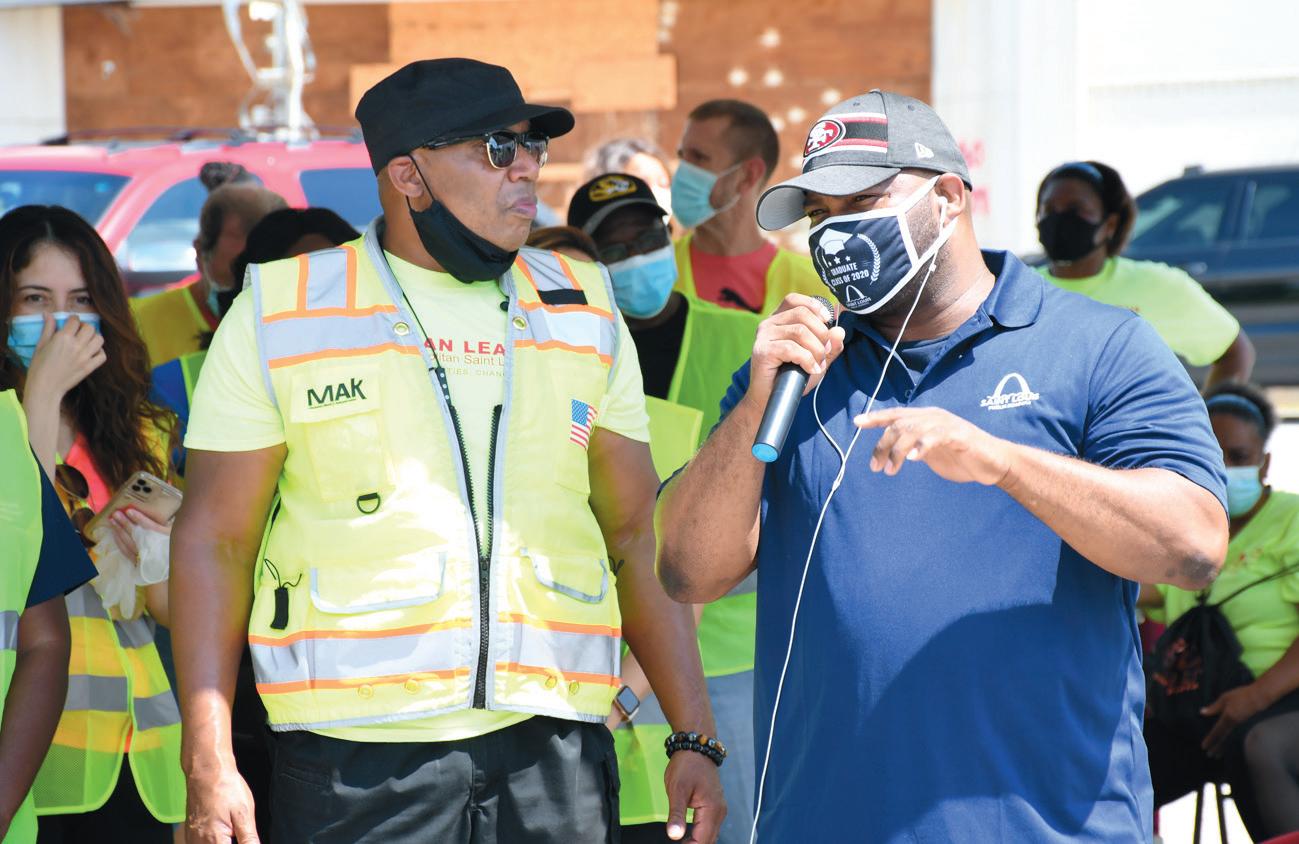
Nearly five months after St. Louis city and county announced shelter-inplace orders to slow the spread of COVID-19 and three months after those orders were lifted, the region continues to reel from the epidemic and its economic impact. In response, community organizations such as the Urban League of Metropolitan St. Louis, Better Family Life and People’s Health Centers continue to serve.
Photos by Wiley Price
